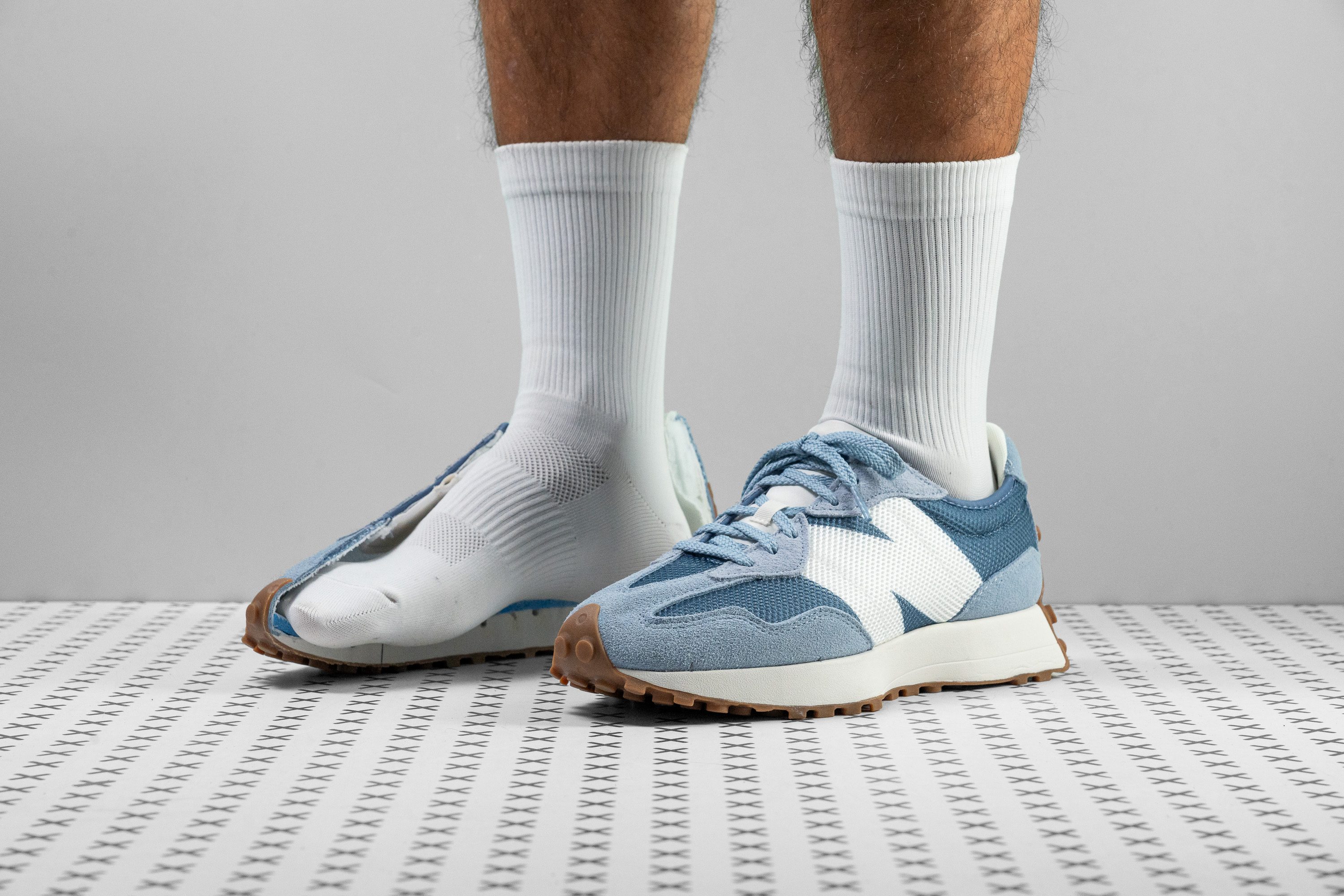Our verdict
- Top pick in best New Balance trainers
- Top pick in best cheap trainers
Pros
- Fashionably sporty
- Excellent impact protection
- Stable and planted platform
- Lightweight and comfortable
- Above average breathability
- Excellent grip
- Suitable for driving
- Budget-friendly
Cons
- Not suitable for wide feet
- Not as supportive as other NB trainers
- Not suitable for wide feet
Audience verdict
- Top 11% most popular trainers
Comparison
The most similar trainers compared
+ + Add a shoe | |||||
|---|---|---|---|---|---|
| Audience score | 90 Good! | 93 Great! | 95 Superb! | 92 Great! | |
| Price | £110 | £75 | £115 | £100 | |
| Style | RetroSporty | RetroSporty | DadRetroSporty | ClassicDadRetroSporty | |
| Shock absorption | High | High | High | High | |
| Energy return | Moderate | Moderate | Moderate | Moderate | |
| Traction | High | High | High | High | |
| Breathability | Breathable | Breathable | Warm | Breathable | |
| Weight lab | 10.6 oz / 301g | 11.6 oz / 329g | 12.9 oz / 366g | 10.9 oz / 308g | |
| Size | True to size | True to size | True to size | True to size | |
| Midsole softness | Balanced | Firm | Soft | Balanced | |
| Material | MeshSuede | Mesh | LeatherMesh | Mesh | |
| Season | SpringFall | Summer | SpringFall | SpringFall | |
| Inspired from | Running | Running | Running | Running | |
| Width / fit | Medium | Medium | Medium | Medium | |
| Toebox width | Medium | Medium | Medium | Medium | |
| Leather/suede quality | Real suede | Real leather | Real leather | Real suede | |
| Toebox durability | Decent | Decent | Decent | Bad | |
| Heel padding durability | Bad | Bad | Decent | Decent | |
| Outsole durability | Good | Decent | Good | Good | |
| Heel stack lab | 35.0 mm | 33.1 mm | 32.3 mm | 37.3 mm | |
| Stiffness | Moderate | Stiff | Moderate | Moderate | |
| Tongue padding | Very thin | Average | Average | Average | |
| Drop lab | 10.0 mm | 12.7 mm | 10.0 mm | 11.9 mm | |
| Forefoot | 25.0 mm | 20.4 mm | 22.3 mm | 25.4 mm | |
| Removable insole | ✓ | ✓ | ✓ | ✓ | |
| Heel tab | None | None | None | Finger loop | |
| Torsional rigidity | Moderate | Moderate | Moderate | Moderate | |
| Heel counter stiffness | Moderate | Moderate | Moderate | Flexible | |
| Closure | Laces | Laces | Laces | Laces | |
| Top | Low top | Low top | Low top | Low top | |
| Ranking | #66 Bottom 45% | #27 Top 23% | #6 Top 5% | #37 Top 31% | |
| Popularity | #13 Top 11% | #43 Top 36% | #3 Top 3% | #2 Top 2% |
Who should buy
We recommend the New Balance 327 as a great choice for:
- Sneakerheads who enjoy vintage trainers with a modern twist
- Those who prioritise excellent traction from their trainers
- Anyone in the market for a lightweight and sporty shoe for casual use
- Those hunting for a breathable summer shoe that’s easy on the wallet
- Frequent drivers and car enthusiasts in need of a shoe that facilitates smooth movement between pedals
Who should NOT buy
The 327 is a snug fit and certainly isn’t roomy enough for those with broad feet. We recommend looking into the NB 574 as a more accommodating option.
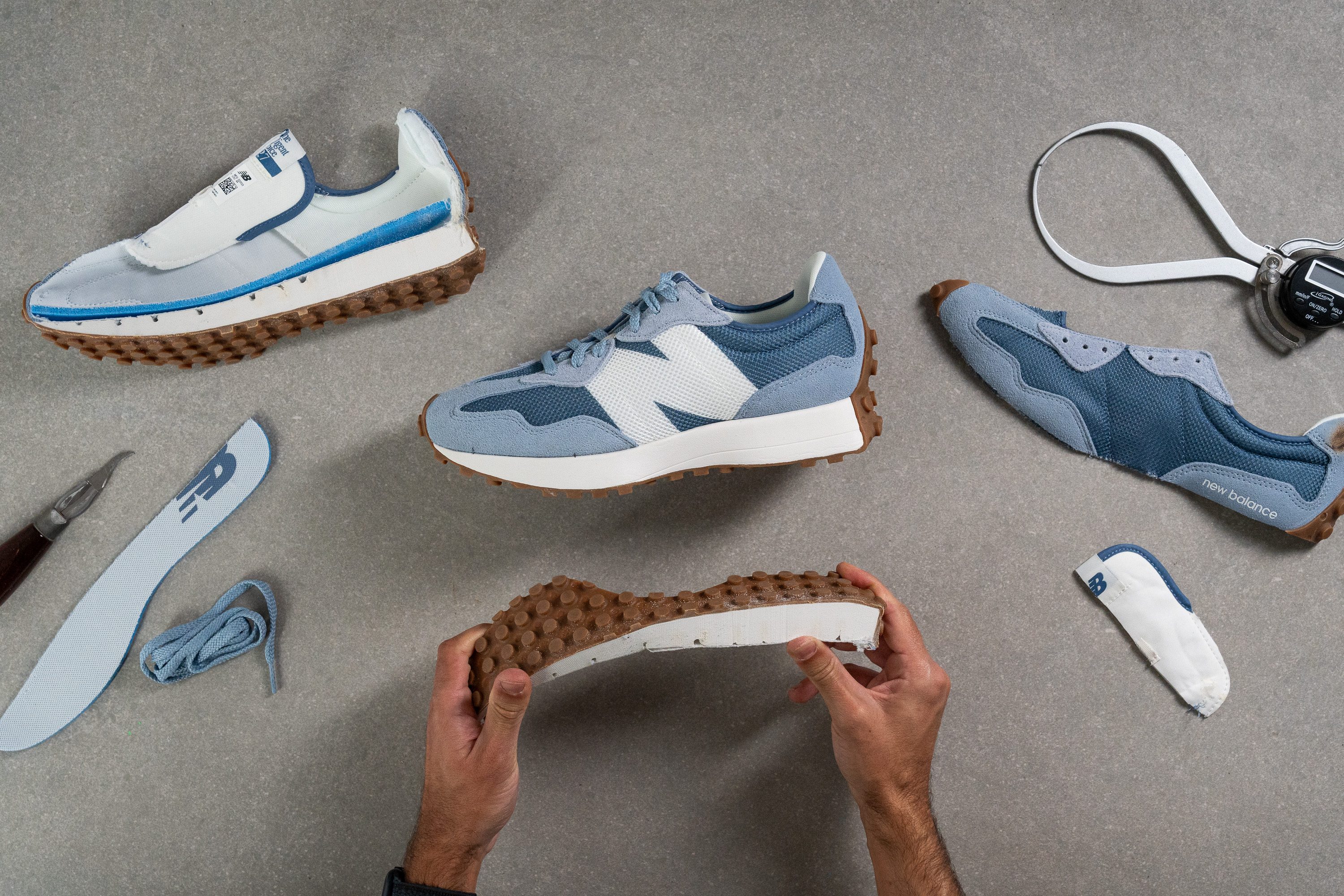
Cushioning
Shock absorption
Hours of walking on hard asphalt and concrete won't be a problem in the New Balance 327 as its thick platform is highly effective at muting out the impact.
Following the acclaimed ASTM F1976 standard, we recorded the shoe's shock absorption at 111 SA, which is a fantastic result for a lifestyle sneaker with no fancy cushioning technologies.
Thus, you can confidently don this pair of New Balance kicks for all-day wear.
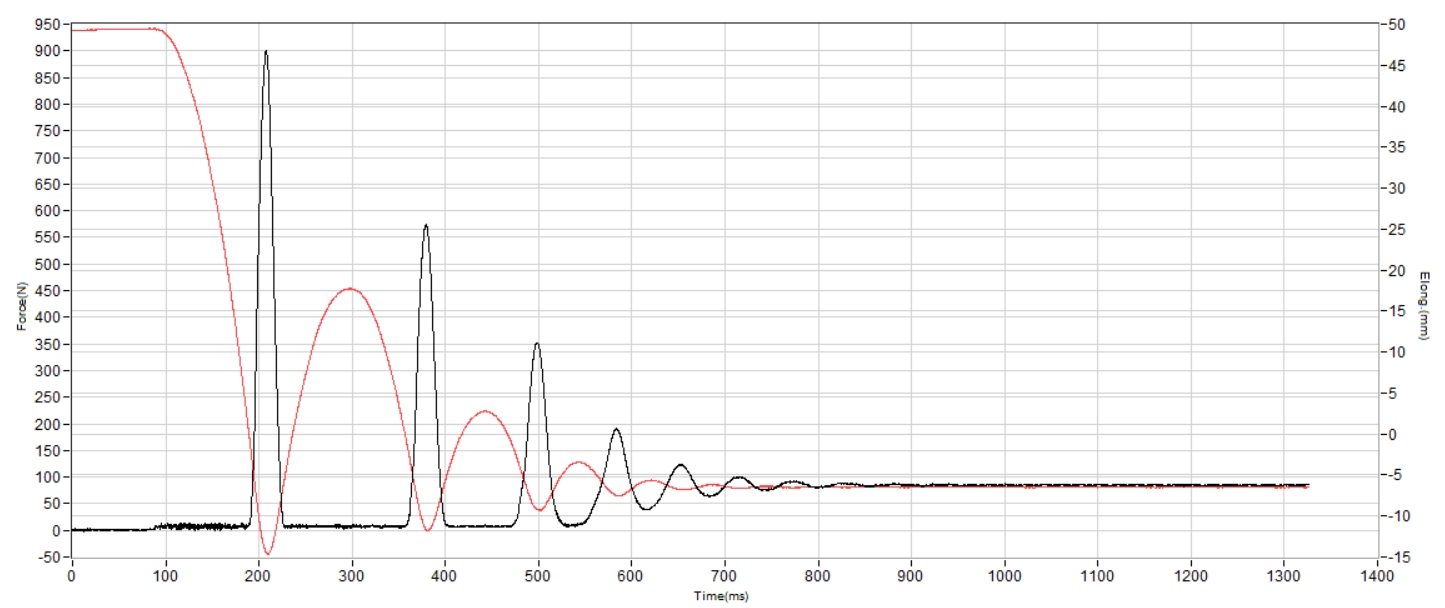
| 327 | 111 SA |
| Average | 89 SA |
Energy return
We also noticed that the 327's dense midsole foam feels rather flat and unresponsive.
That's why we weren't surprised at the below-average energy return measurement of 46% in our test. This kick doesn't feel particularly springy, but on the bright side, it offers a stable and supportive base.
| 327 | 45.9% |
| Average | 50.2% |
Heel stack
Using our calliper, we measured the 327’s stack to be 35 mm thick at the heel.
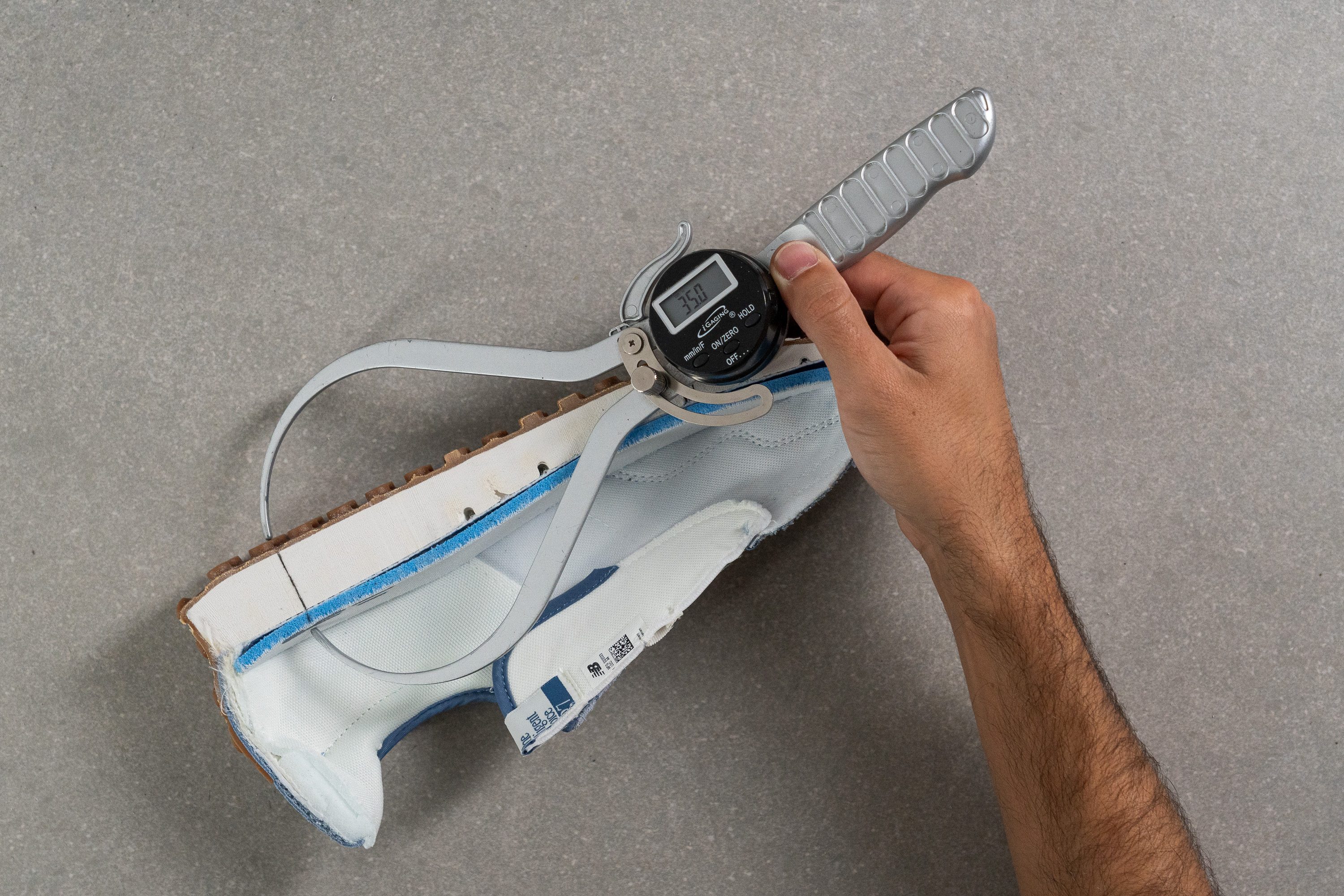
This is higher than average and means that we have plenty of foam underfoot to enjoy well-cushioned landings in this shoe.
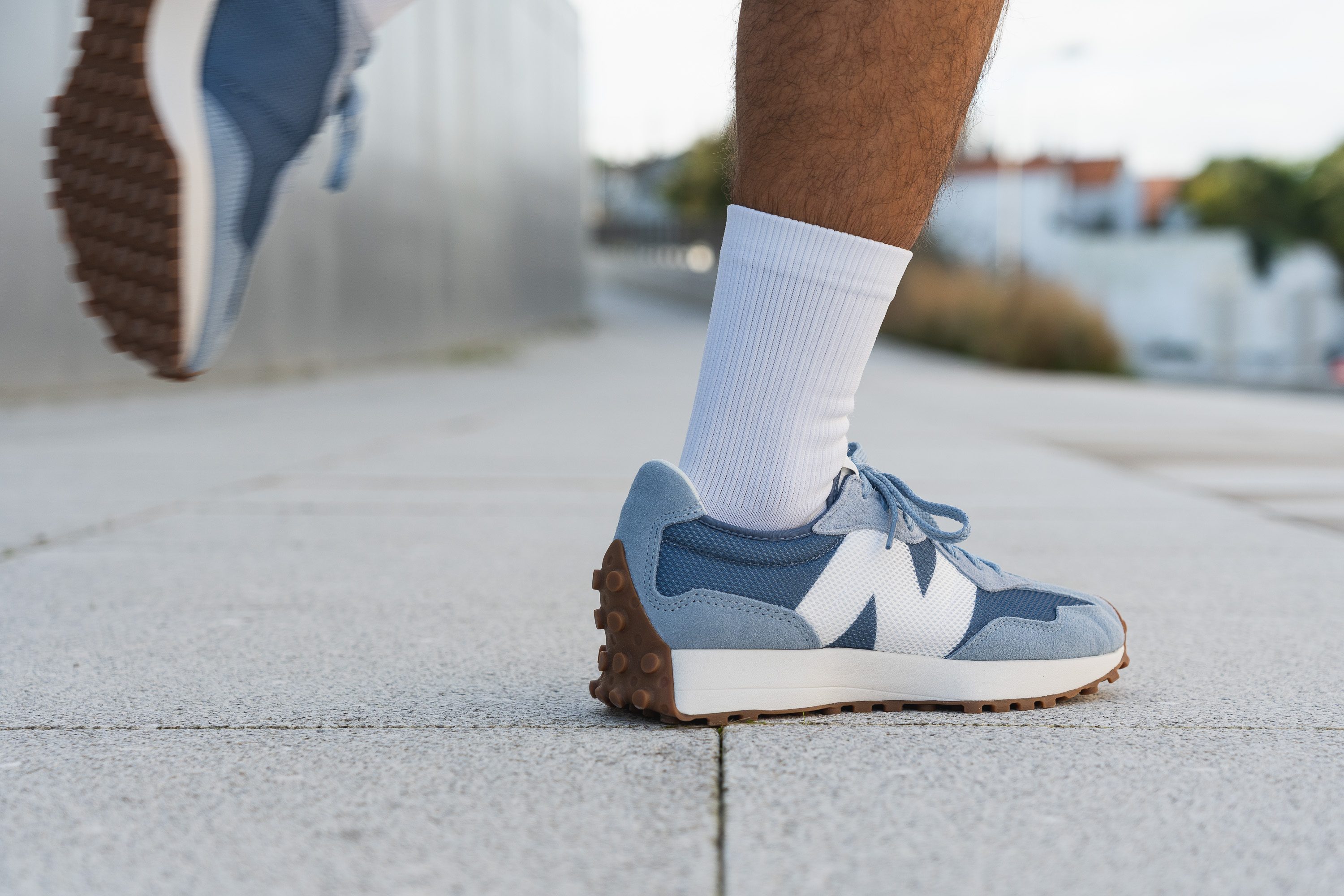
| 327 | 35.0 mm |
| Average | 30.7 mm |
Forefoot stack
Moving up to the forefoot, we found the 327’s stack to be 25 mm thick according to our calliper measurements. This is quite chunky compared to the average and rivals the heel stack of some trainers. As a result, we felt extremely protected and comfortable as we walked around in the 327 which keeps our feet high above any hazards below.
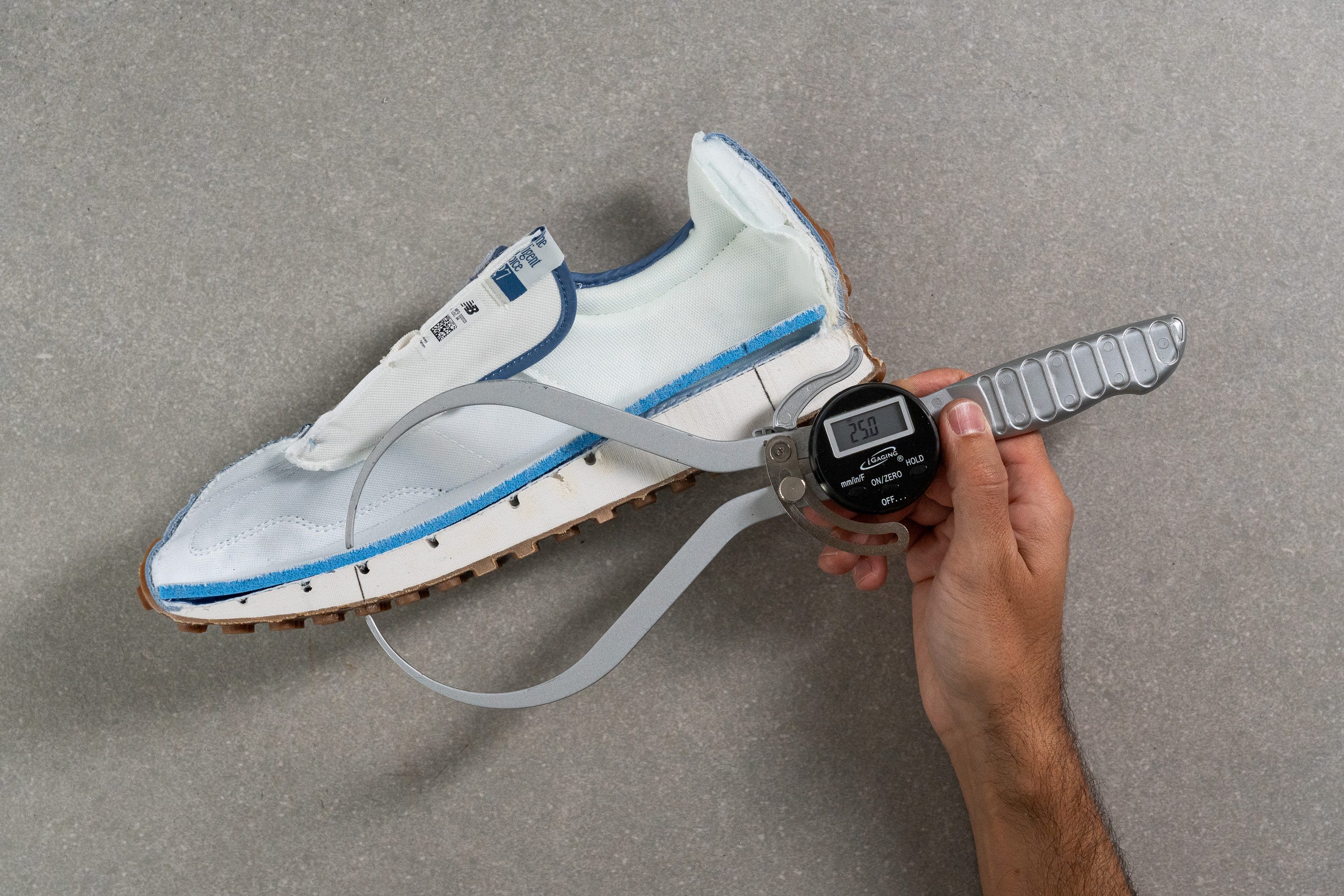
For those who prefer low-profile shoes that offer more ground feel, we recommend looking into the Adidas Gazelle instead.
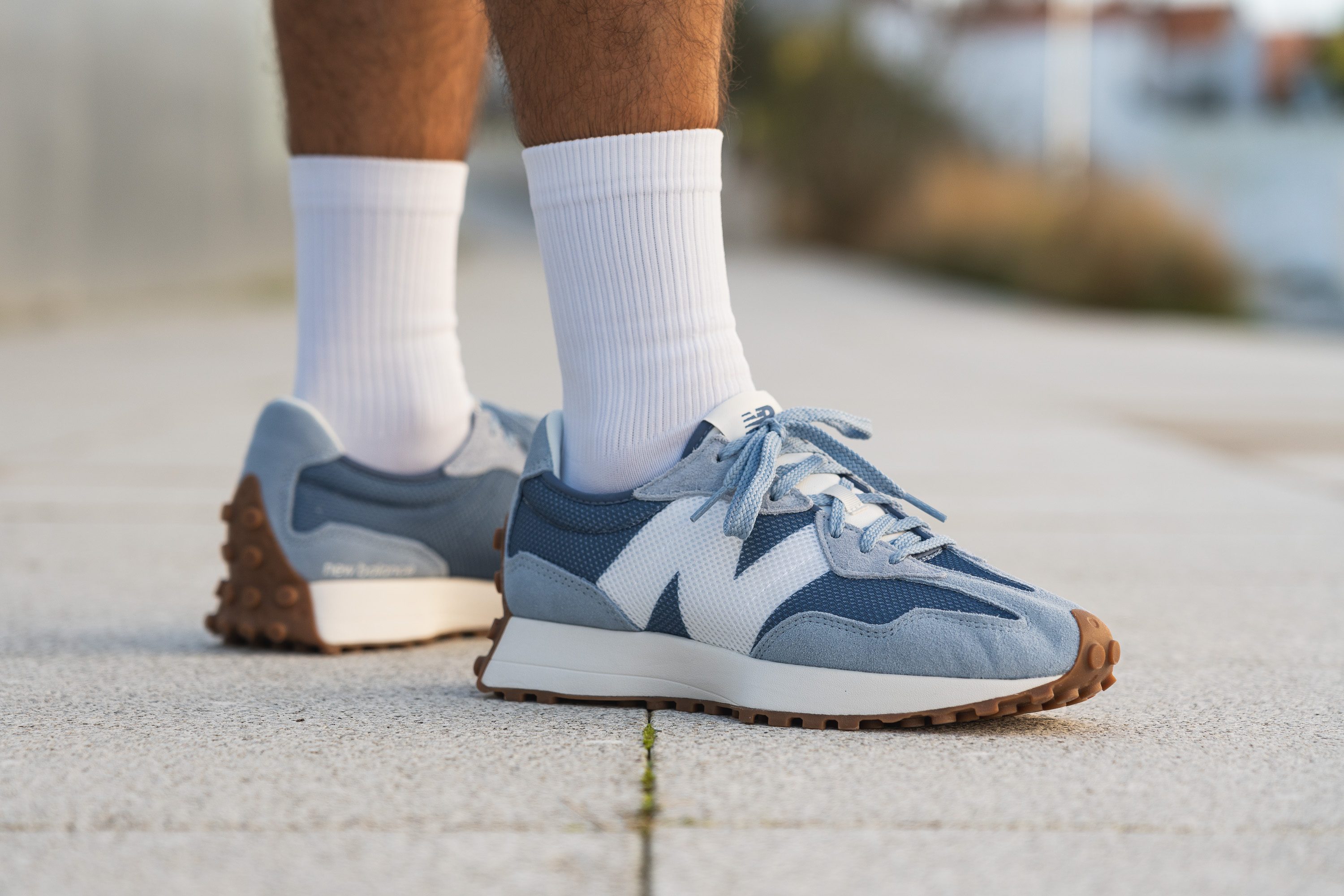
| 327 | 25.0 mm |
| Average | 19.5 mm |
Drop
The difference in our stack measurements leaves us with a heel drop of 10 mm, which is only slightly shorter than average. This feels pretty balanced and should feel fine for most people as many of us are used to wearing shoes with elevated heels.
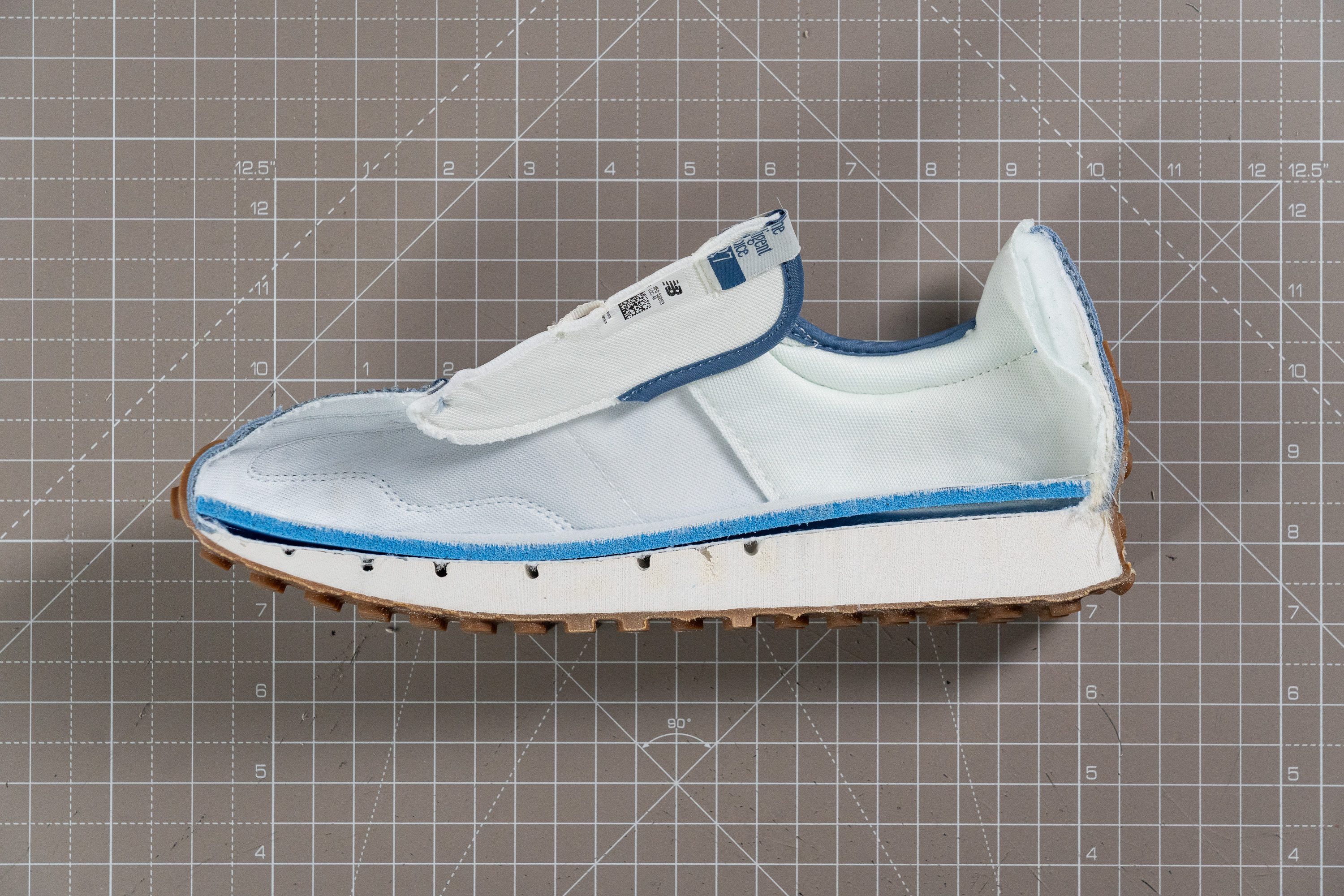
On the other hand, for those whose preference lies with feeling more parallel to the ground, we recommend checking out Altra and their wide range of zero-drop shoes.
| 327 | 10.0 mm |
| Average | 11.2 mm |
Midsole softness
UpdatedPressing our durometer against the 327’s EVA midsole yields a standard reading of 46.5 AC, placing the shoe into the moderately soft cushioning range.
However, its high-stacked platform increases our perceived cushioning, making this New Balance kick feel softer in reality than its durometer's static measurement suggests.
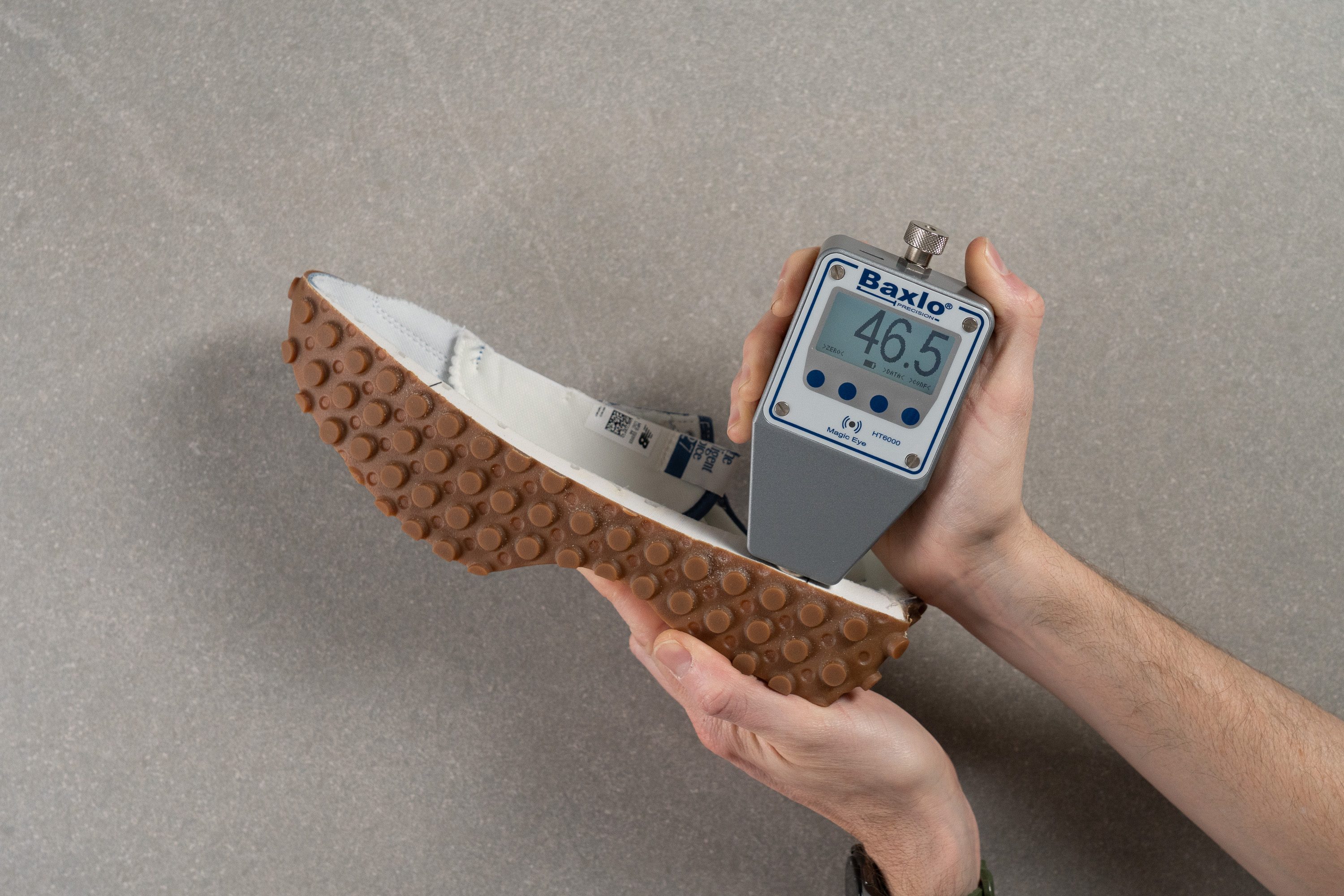
| 327 | 46.5 AC |
| Average | 47.8 AC |
Size and fit
Size
New Balance 327 fits true to size (1301 votes).
Internal length
| 327 | 265.3 mm |
| Average | 272.3 mm |
Width / Fit
Because of its streamlined silhouette, the New Balance 327 appears to have a snug fit. But on foot, we felt a regular amount of internal space. So let's have a look at the gel mould of 327's interior to confirm that.
Applying our calliper to the mould's widest part, it returned a typical width of 92.1 mm. That confirms the shoe's D medium fit.
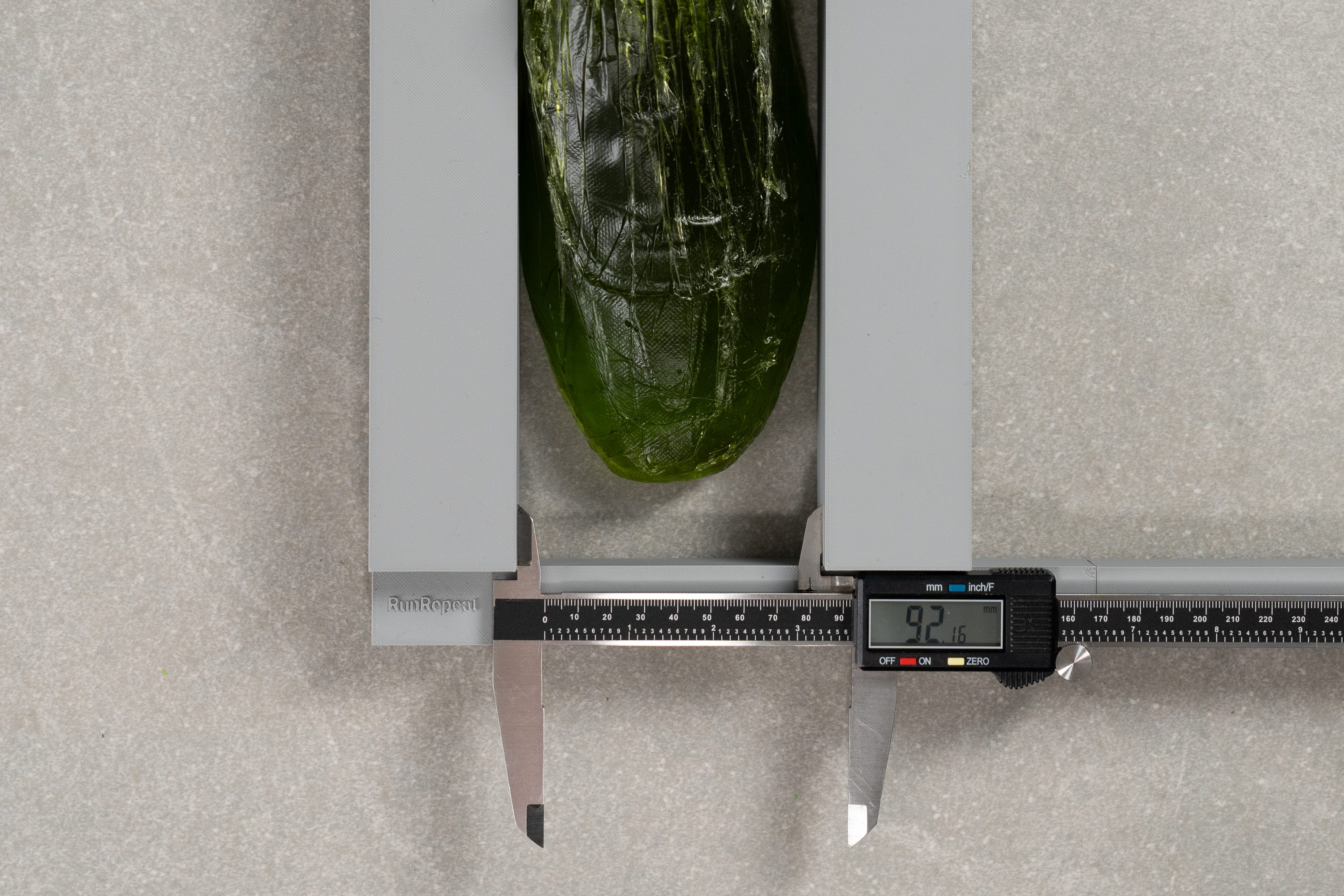
| 327 | 92.1 mm |
| Average | 92.5 mm |
Toebox width
The 327's toebox shape may not be as rounded as that of other NB shoes but it is rather moderately tapered. The calliper recorded a normal width of 69.0 mm near the big toe.
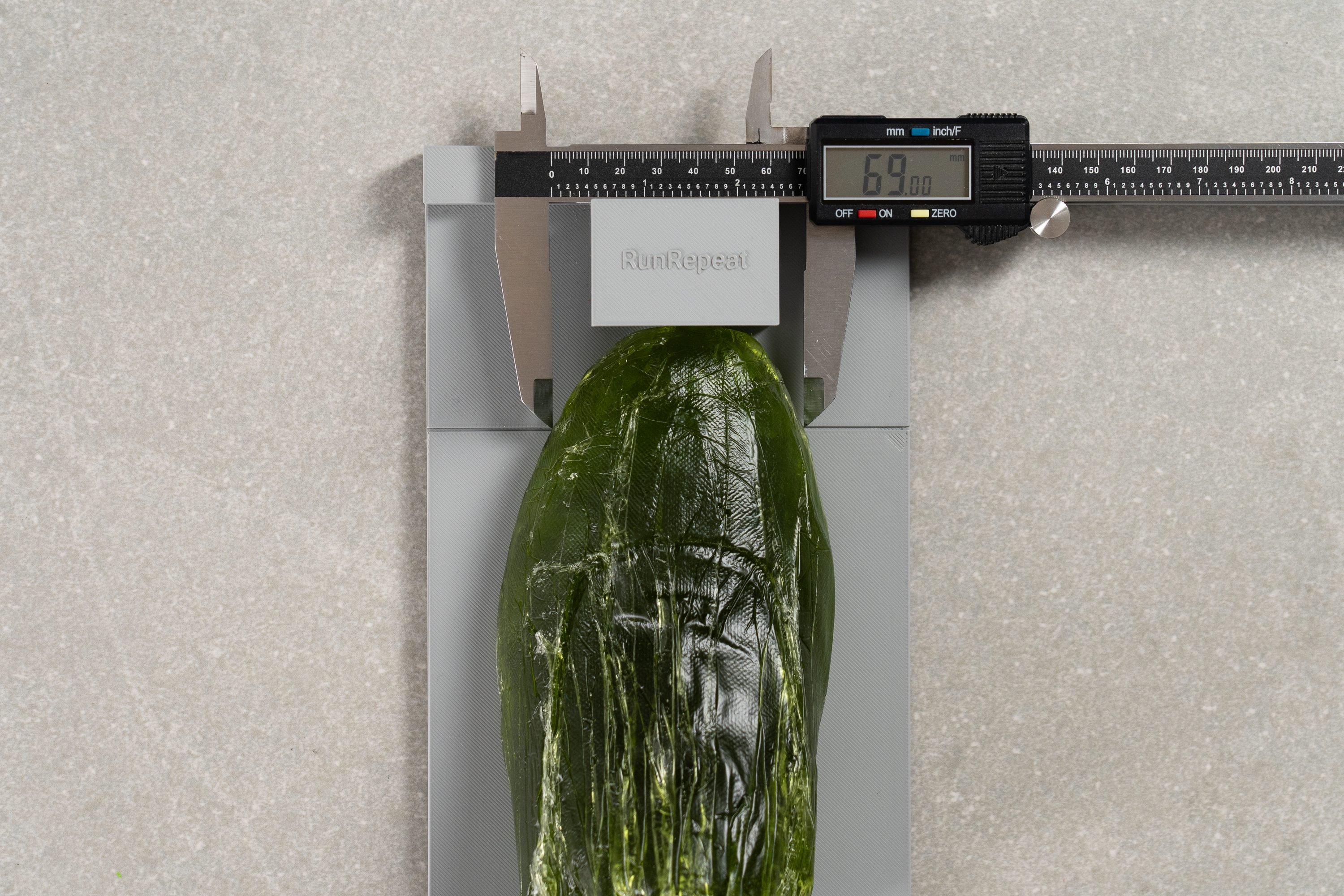
| 327 | 69.0 mm |
| Average | 68.9 mm |
Toebox height
The toebox height is actually pretty generous in this NB silhouette. We got an above-average reading of 30.4 mm here.
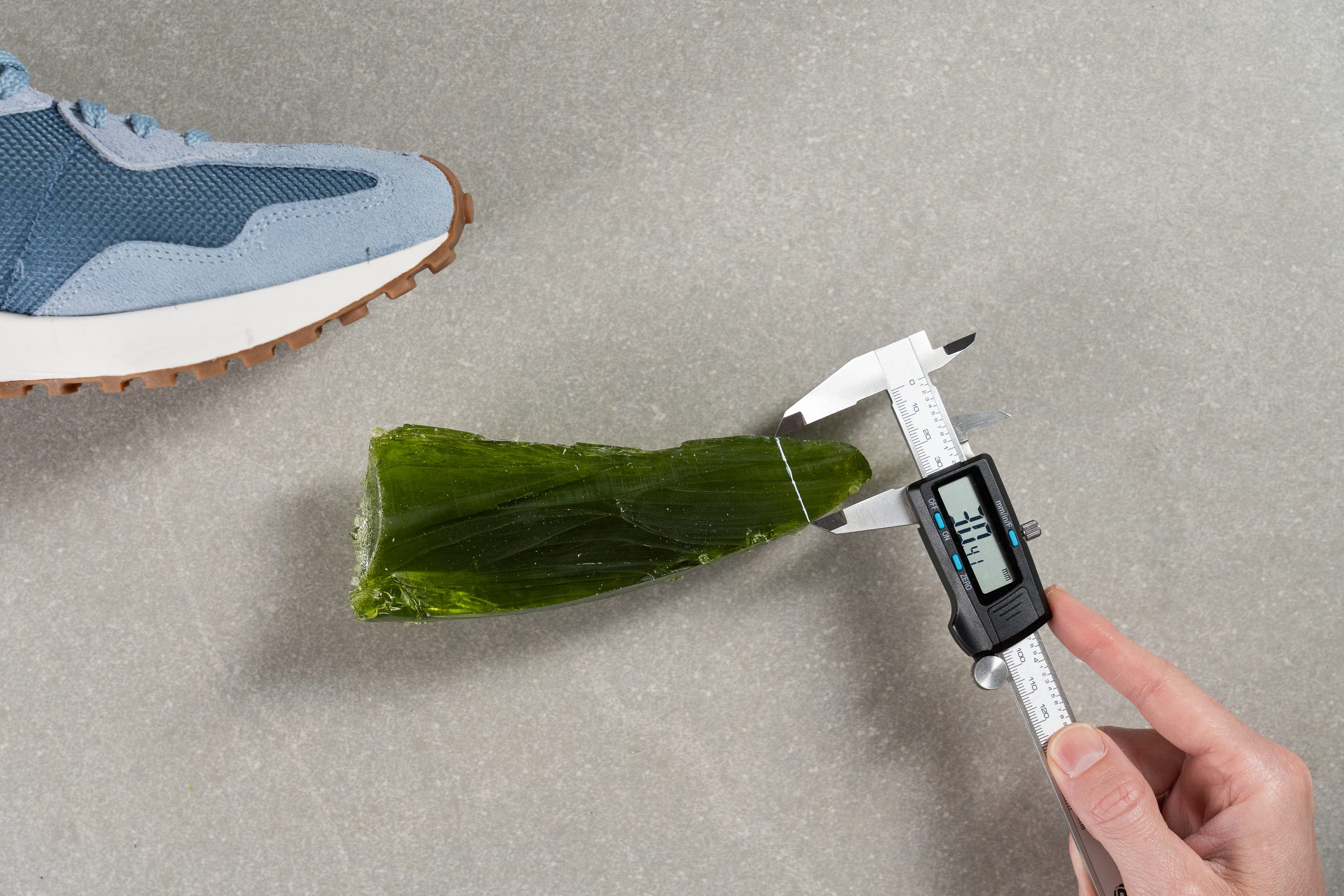
| 327 | 30.4 mm |
| Average | 27.8 mm |
Traction / Grip
The highlight feature of this shoe is certainly its prominent outsole which extends into a flashy triangle at the rear of the shoe. The many circular “lugs” that dot the outsole provide us with excellent traction over a variety of surfaces. Their configuration also means that this shoe is well-suited for park days as we were still able to get good traction on damp grass.

What’s more, the way the outsole extends up the contour at the rearfoot feels great as we rest our heel against the floor while driving and facilitates switching between pedals seamlessly.
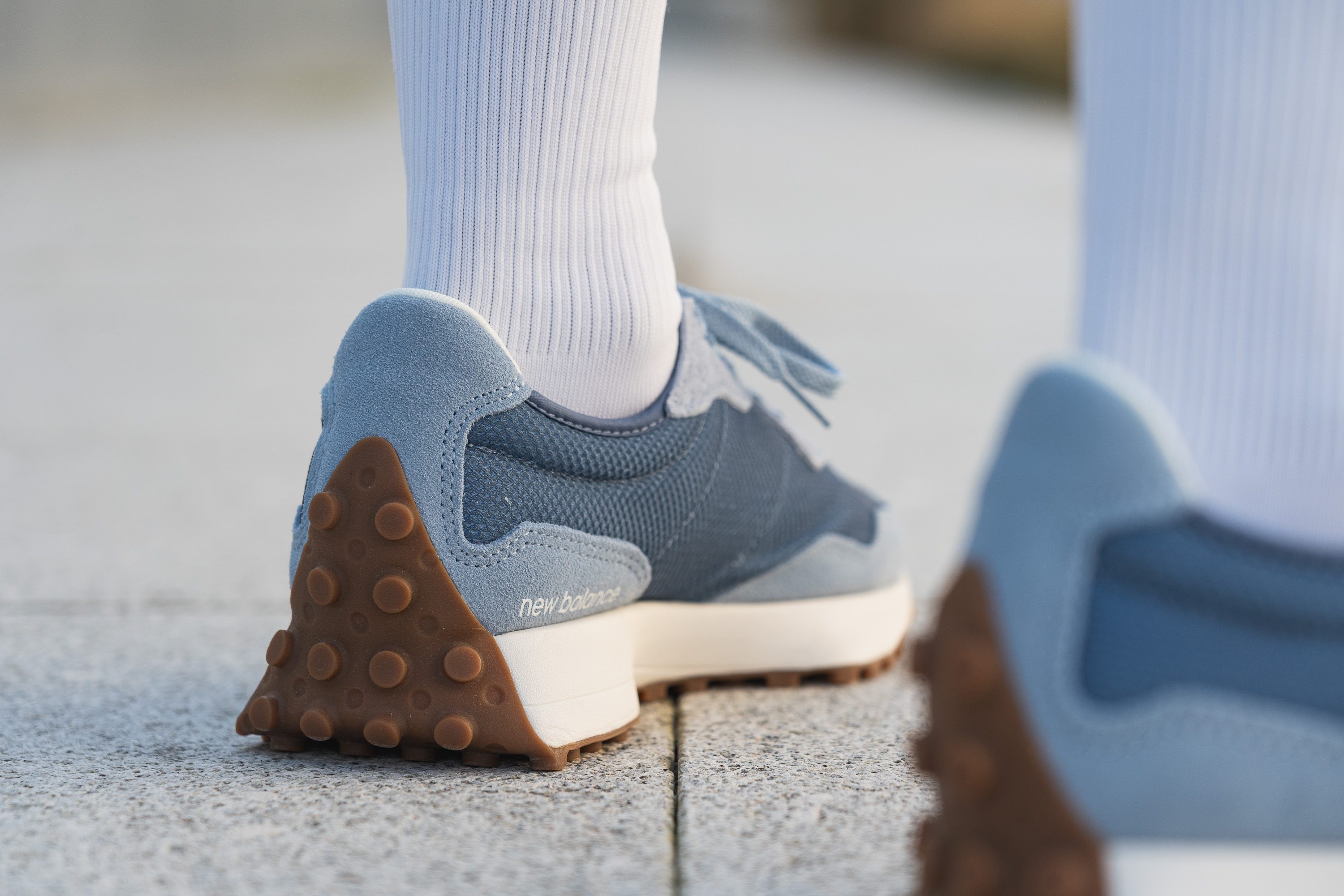
Traction test
Is the shoe's whimsical treading functional or is it only there for looks? Luckily, our lab test proved the former as the 327's heel returned an above-average friction score of 0.51!
So not only does it bite dry and wet surfaces with ease, but it also does it better than many other trainers we've tested!
| 327 | 0.51 |
| Average | 0.43 |
Outsole design
The 327's unique dotted outsole is impossible to confuse with any other shoe! Its many circular 'pimples' cover the entire outsole and even continue to the rearfoot along with the rubber.
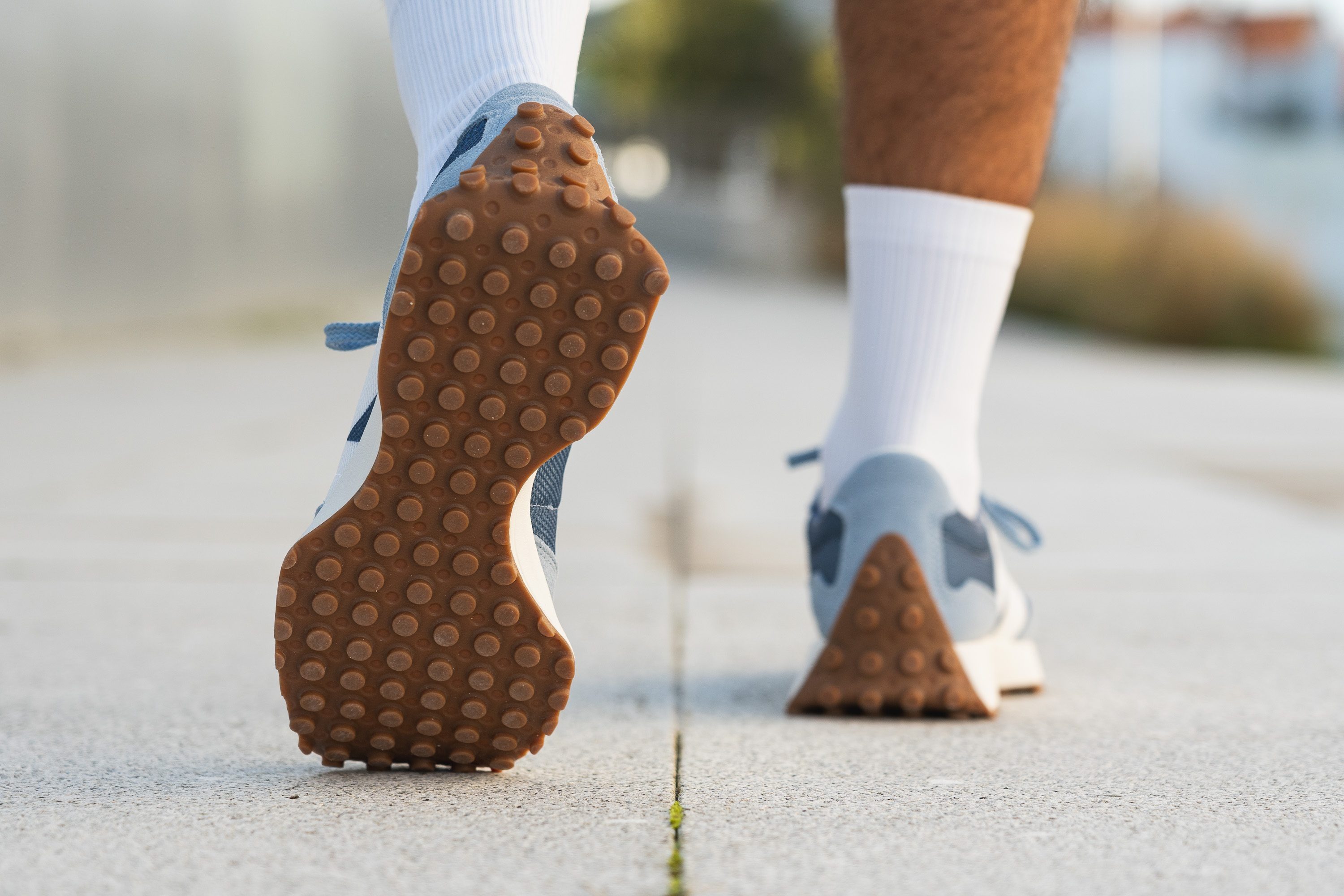
Flexibility / Stiffness
With its thick and dense slab of EVA foam, we expected the 327 to be significantly stiffer than average. But curiously enough, our shoe flexing tester showed that it required a standard amount of force (13.8N) to bend by 30 degrees!
This makes the NB 327's ride fairly balanced as it feels stable and supportive without sacrificing a certain amount of comfort.
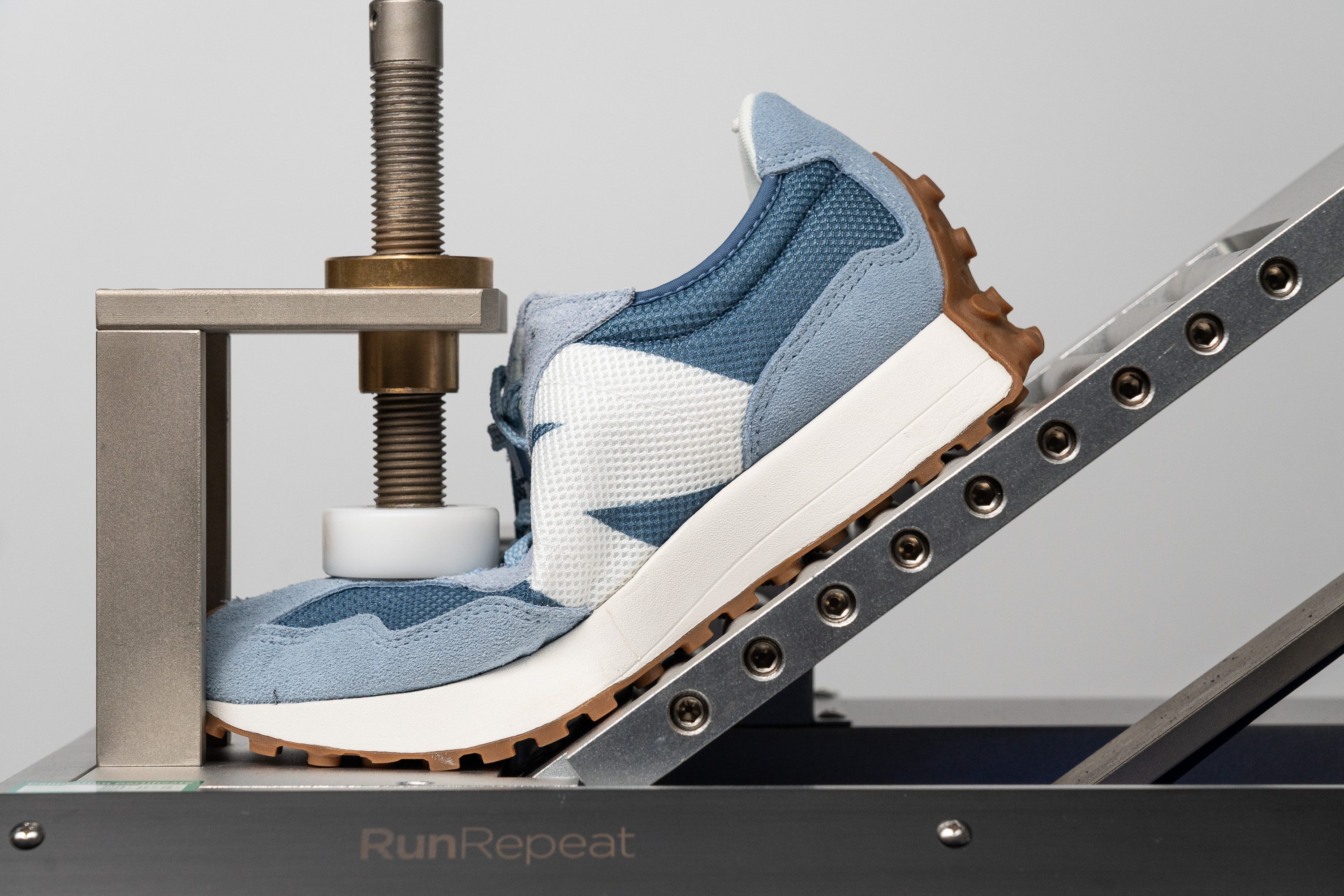
| 327 | 13.8N |
| Average | 13.3N |
Weight
Despite the substantial amount of rubber found on the shoe, the 327 is surprisingly lightweight; tipping the scale at only 10.6 oz (301g).
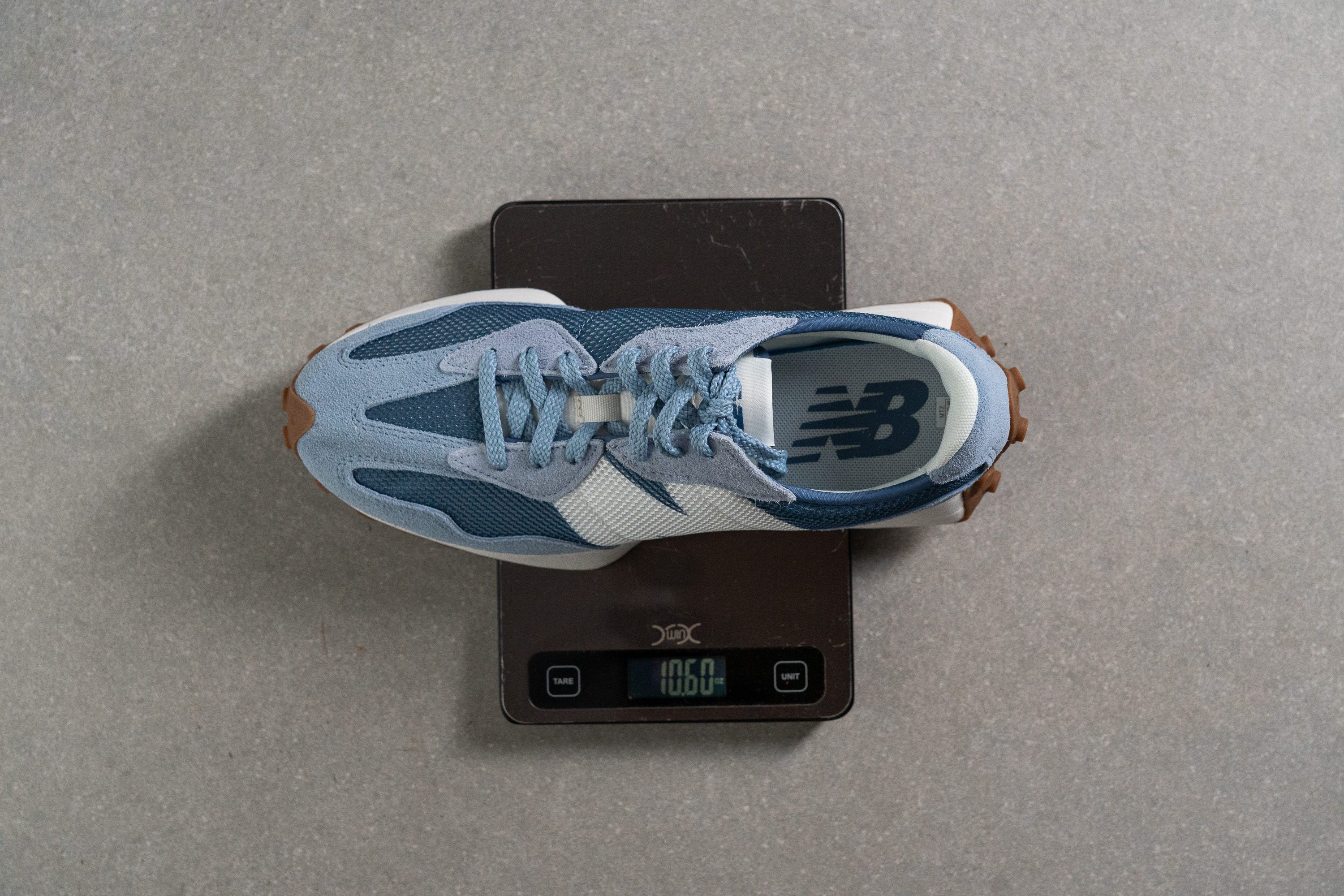
This is much lighter than the average sneaker and means that the 327 never felt cumbersome as we tested the shoe, even when walking around for extended periods.
| 327 | 10.6 oz (301g) |
| Average | 13.8 oz (390g) |
Breathability
We pumped the 327 full of smoke to get an idea of how well-ventilated it is. As we can clearly see from the footage, smoke is able to escape the shoe quickly and relatively evenly throughout. This performance earns the 327 an above-average breathability score of 4 out of 5, thus making the shoe a good choice for those toasty summer days.
To illuminate matters further, we inspected a backlit cross-section of the 327 and found that the light easily shines through the many perforations in the upper’s porous mesh sections.
Looking at a closeup image of the 327’s upper mesh under our microscope reveals it to be made of very thin fibres interwoven and braided with lots of gaps and holes that promote excellent airflow through the shoe.
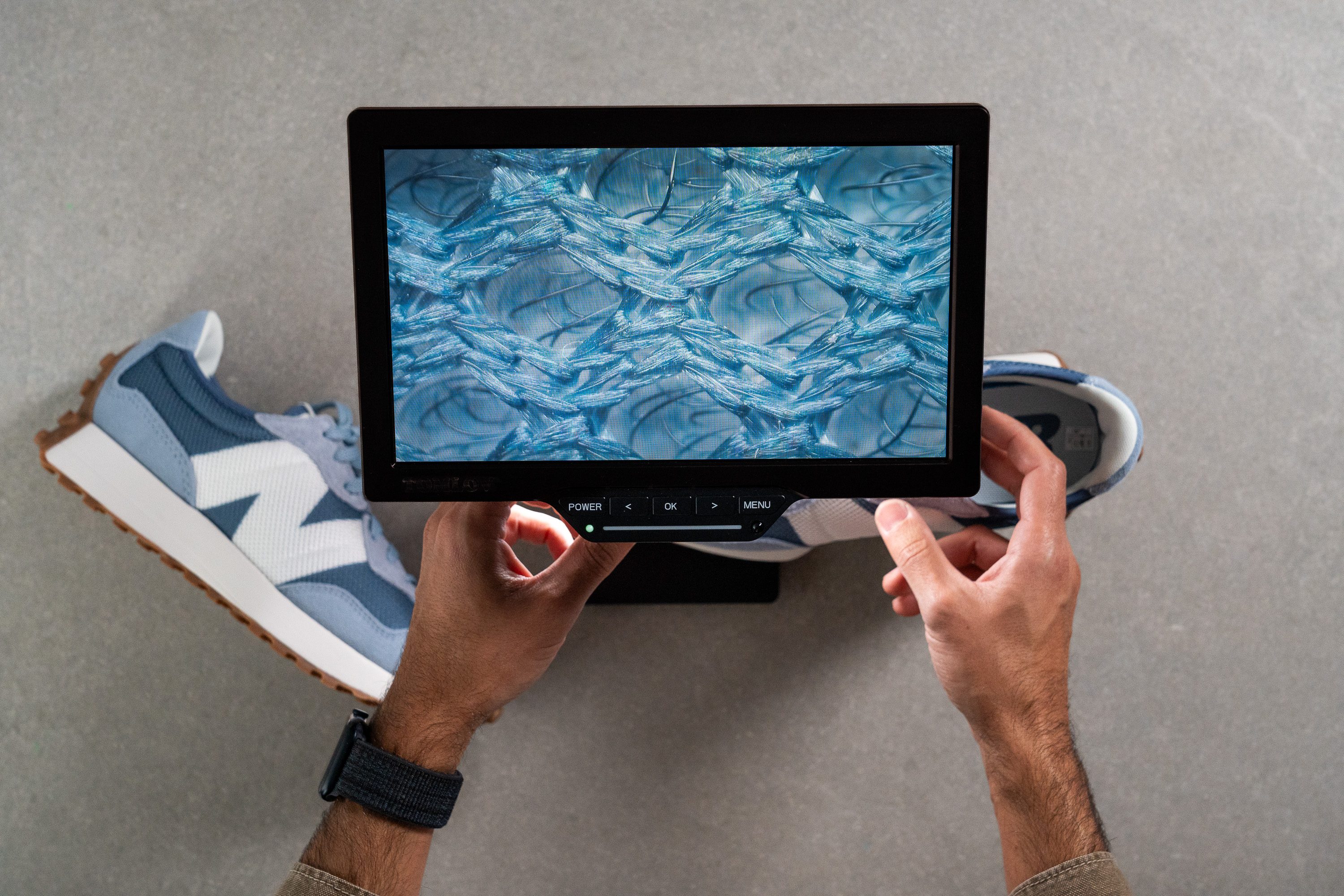
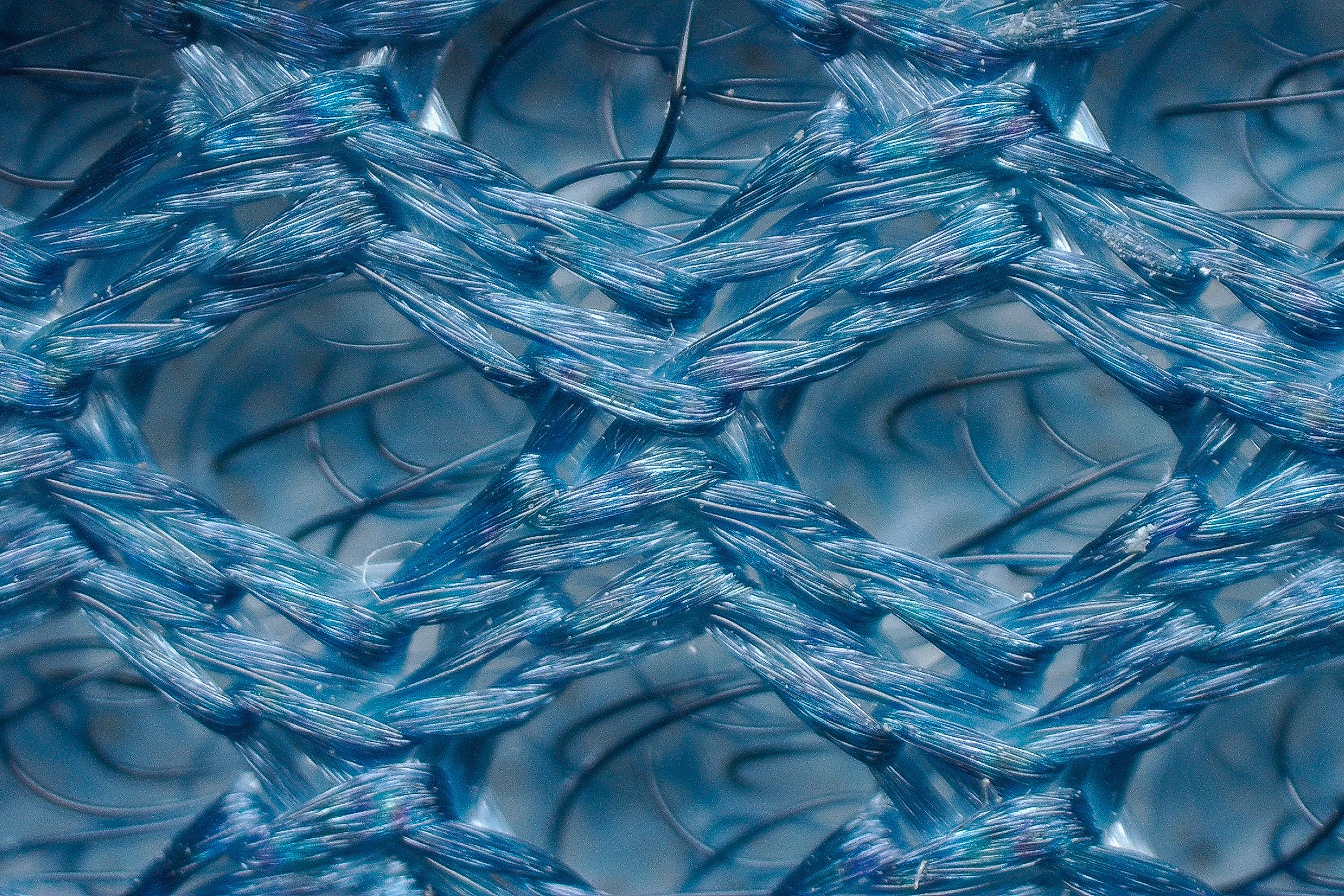
| 327 | 4 |
| Average | 3 |
Stability
Lateral stability test
Coming from a brand known for shoes with excellent arch support, it’s no surprise that the 327 feels exceptionally stable and well-planted underfoot.
Torsional rigidity
One key way that the 327 maintains such a stable base is through a high level of torsional rigidity, which we scored 4 out of 5 on our subjective scale after our manual assessment. As such, the shoe is able to mitigate any excessive lateral movements that lead to instability. This is also helpful for those with overpronating strides.
| 327 | 4 |
| Average | 3.6 |
Heel counter stiffness
Squeezing and prodding at the 327’s heel counter reveals it to be moderately stiff, earning a middle-of-the-road score of 3 out of 5 on our subjective scale. This level of stiffness means that we were able to achieve a snug lockdown without the heel collar putting too much pressure on our tendons or restricting the natural movement of our foot.
| 327 | 3 |
| Average | 3.2 |
Midsole width - forefoot
The biggest contributor to how stable the 327 feels underfoot is its behemoth of a platform that measures 119.5 mm wide at the forefoot. This is much wider than average and goes far to explain how well-planted we feel in this shoe.
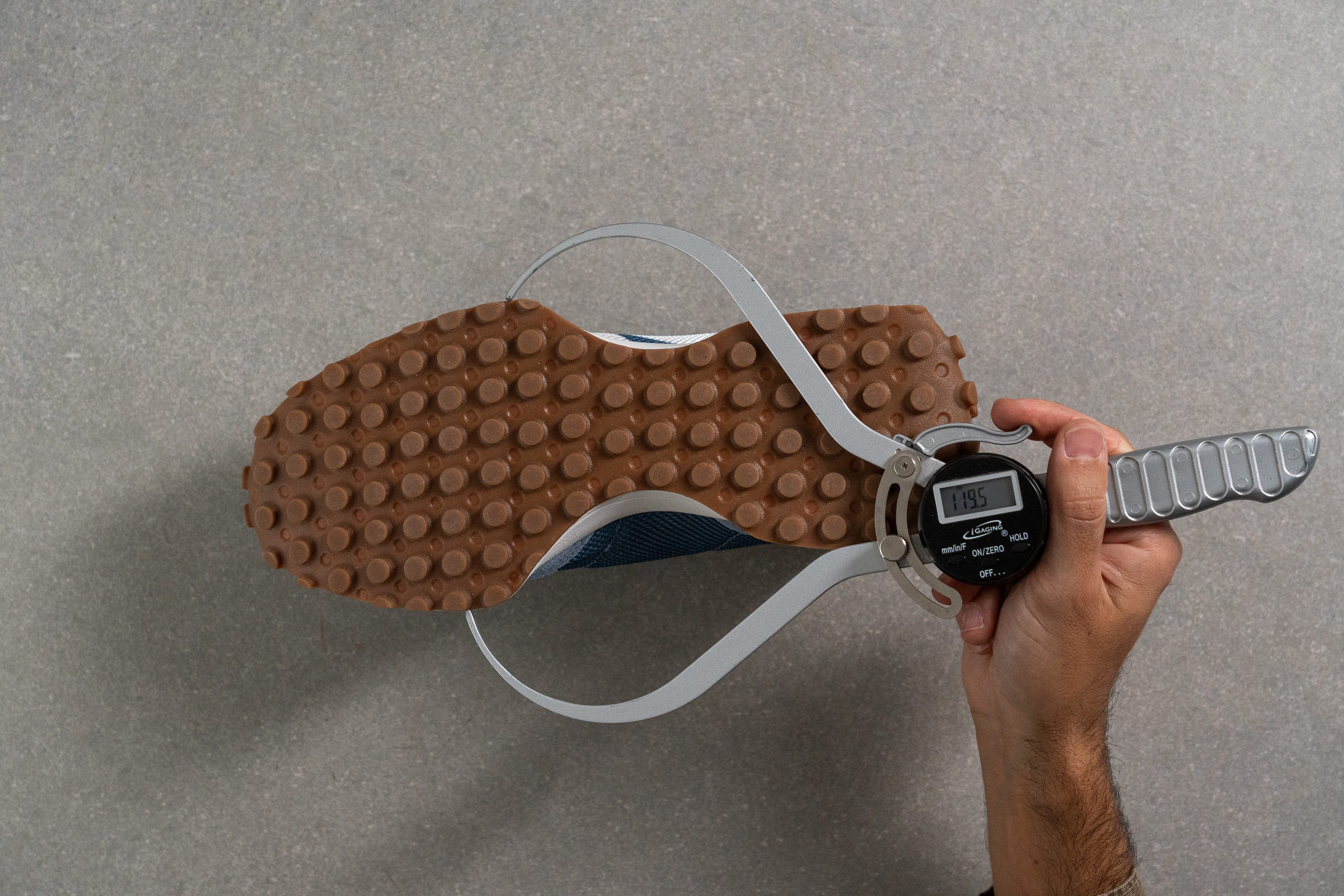
Furthermore, this wide midsole in combination with the rather snug toebox (which will be discussed below) serves to really lock us in place within the shoe, which feels more like an extension of our foot. This makes the 327 feel exceptionally stable yet agile underfoot.
| 327 | 119.5 mm |
| Average | 108.9 mm |
Midsole width - heel
The 327’s midsole is similarly robust at the heel, measuring 90.6 mm wide according to our caliper. This is much wider than our current lab average for sneakers.
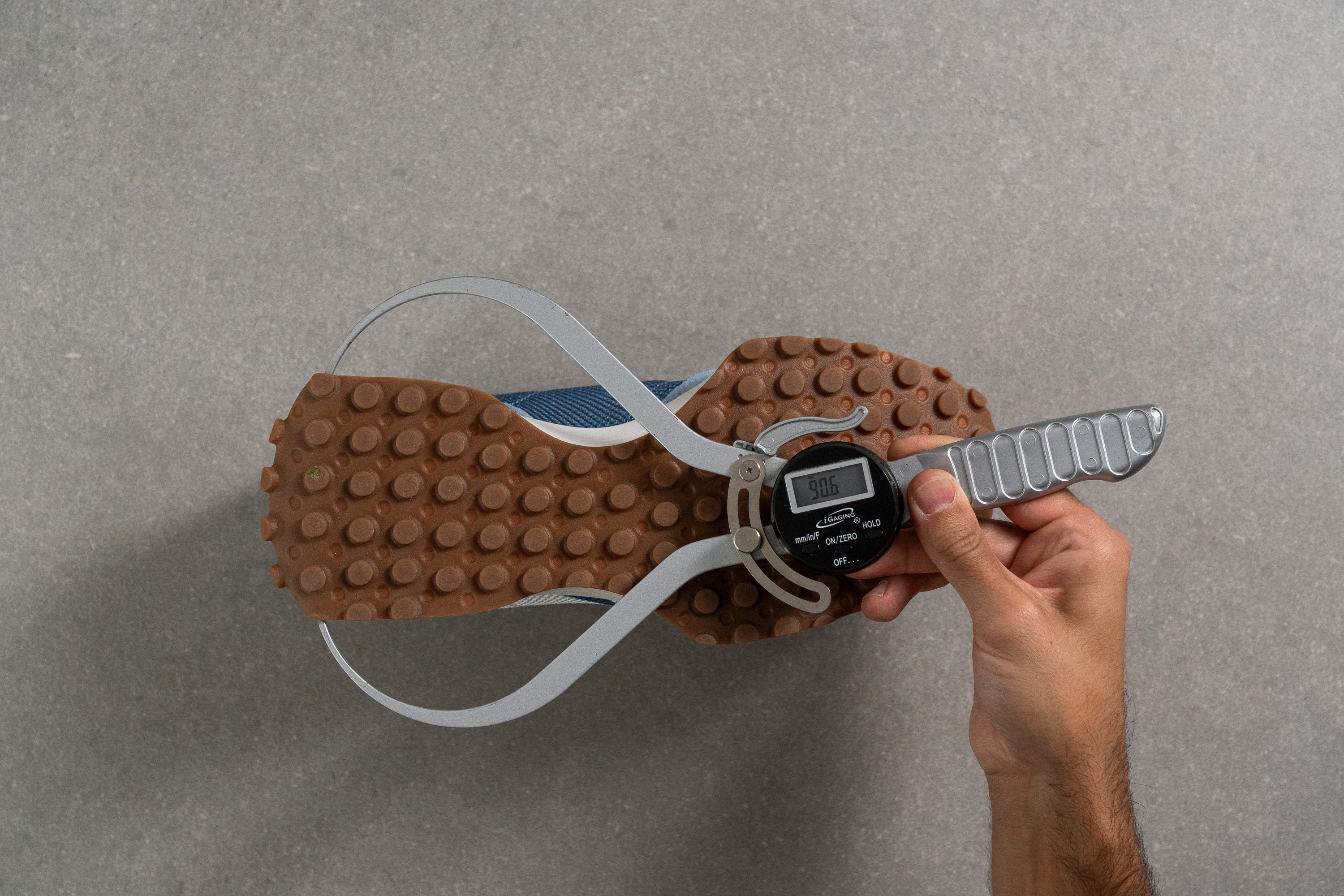
| 327 | 90.6 mm |
| Average | 84.0 mm |
Durability
Leather/Suede quality
Using our blowtorch, we burned the 327’s overlays and found them to be genuine suede. We can tell by how the material merely gets scorched rather than melting or catching fire as a synthetic material would.
| 327 | Real suede |
Toebox durability
To test the durability of the 327’s toebox, we fired up our Dremel to 5K RPM and applied the grinding element to the shoe with 3.2N of force. This has an immediate effect that sends shreds of suede flying all over.
Despite the four-second test being visually dramatic, we found that we hadn’t inflicted as much damage as anticipated, with only an unsightly indent left in the aftermath. This leads us to give the 327 a respectable 3 out of 5 for toebox durability and to predict that it should last 500 miles of normal use with no issues.
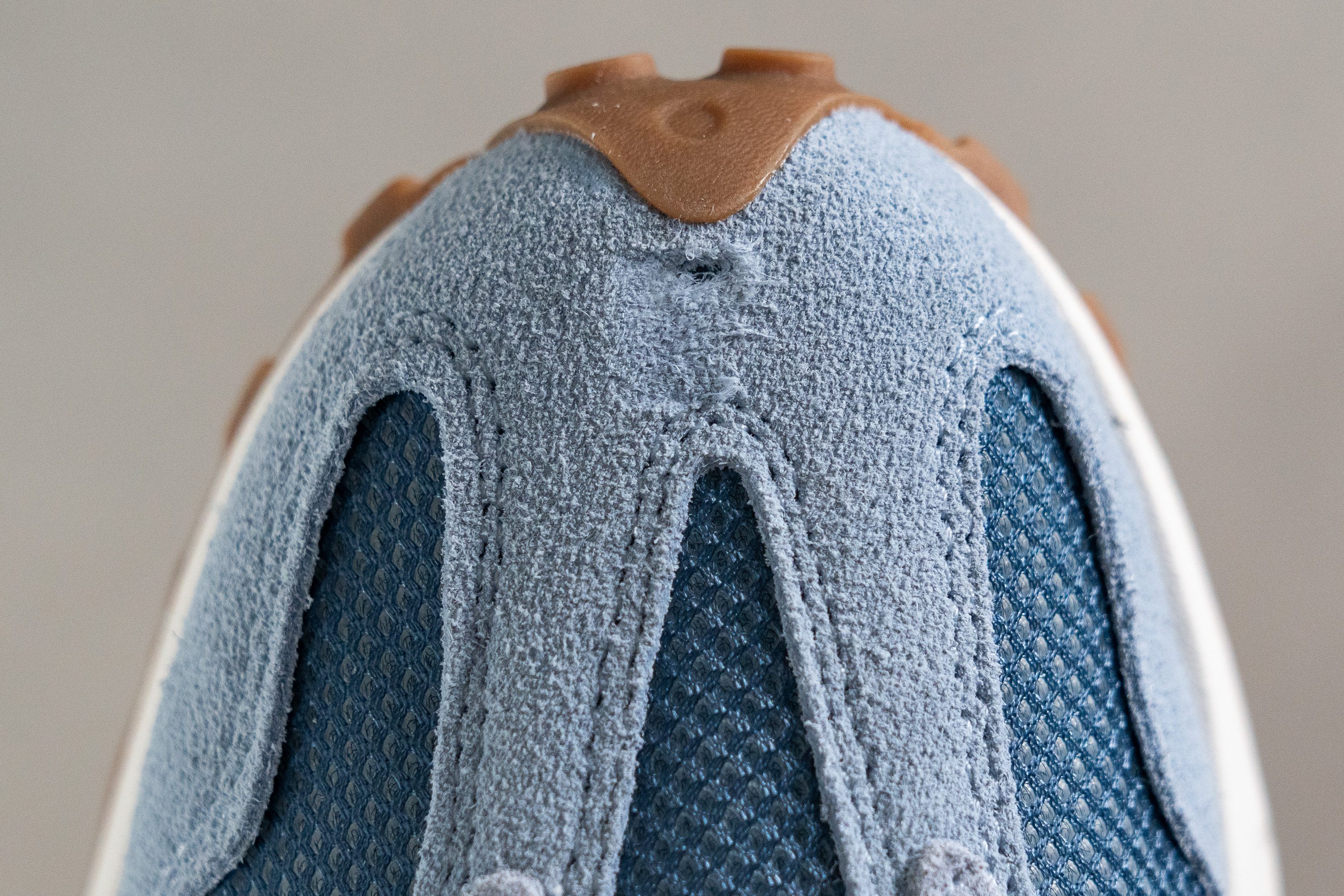
| 327 | 3 |
| Average | 3.7 |
Heel padding durability
Next to face the Dremel is the 327’s generously padded heel counter. While the test isn’t as visually exciting as the last, the tool’s grinding element was quick to blast through the lining material and feat upon the soft padding below.
It’s difficult to see from the aftermath photo, but our tool really did a number on the 327’s heel counter during the four-second test. The hole it left is quite pronounced and gaping enough to fit our finger, leading us to give it a less-than-stellar 1 out of 5 for heel padding durability. As such, we don’t recommend going sockless in this shoe as the constant friction of sweaty heels will likely take a toll on its integrity after some time.
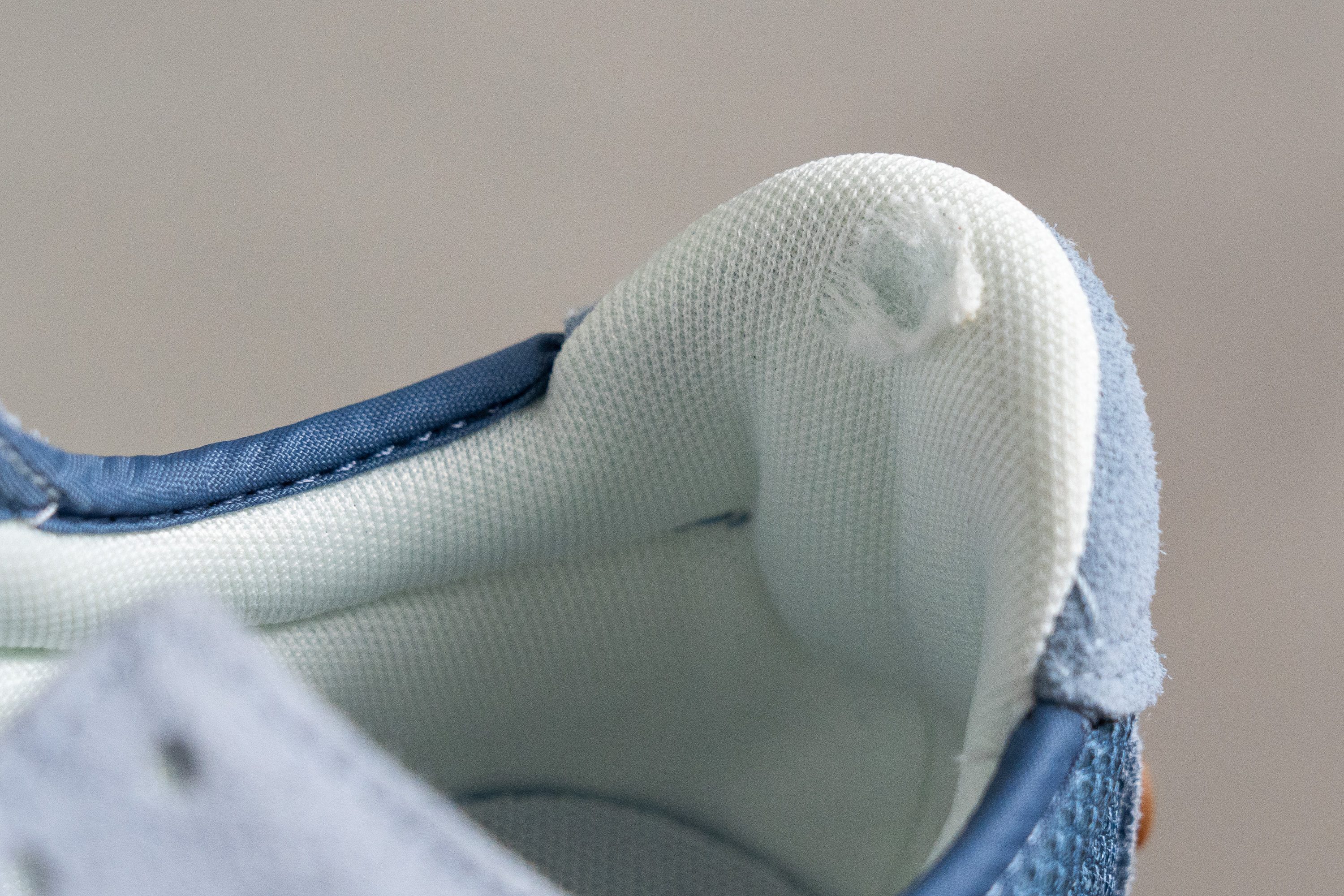
| 327 | 1 |
| Average | 3.2 |
Outsole hardness
Using our durometer to test the hardness of the 327’s outsole reveals it to be right within the average range and 85.5 HC. This level of hardness usually denotes a healthy mix of grip and durability.
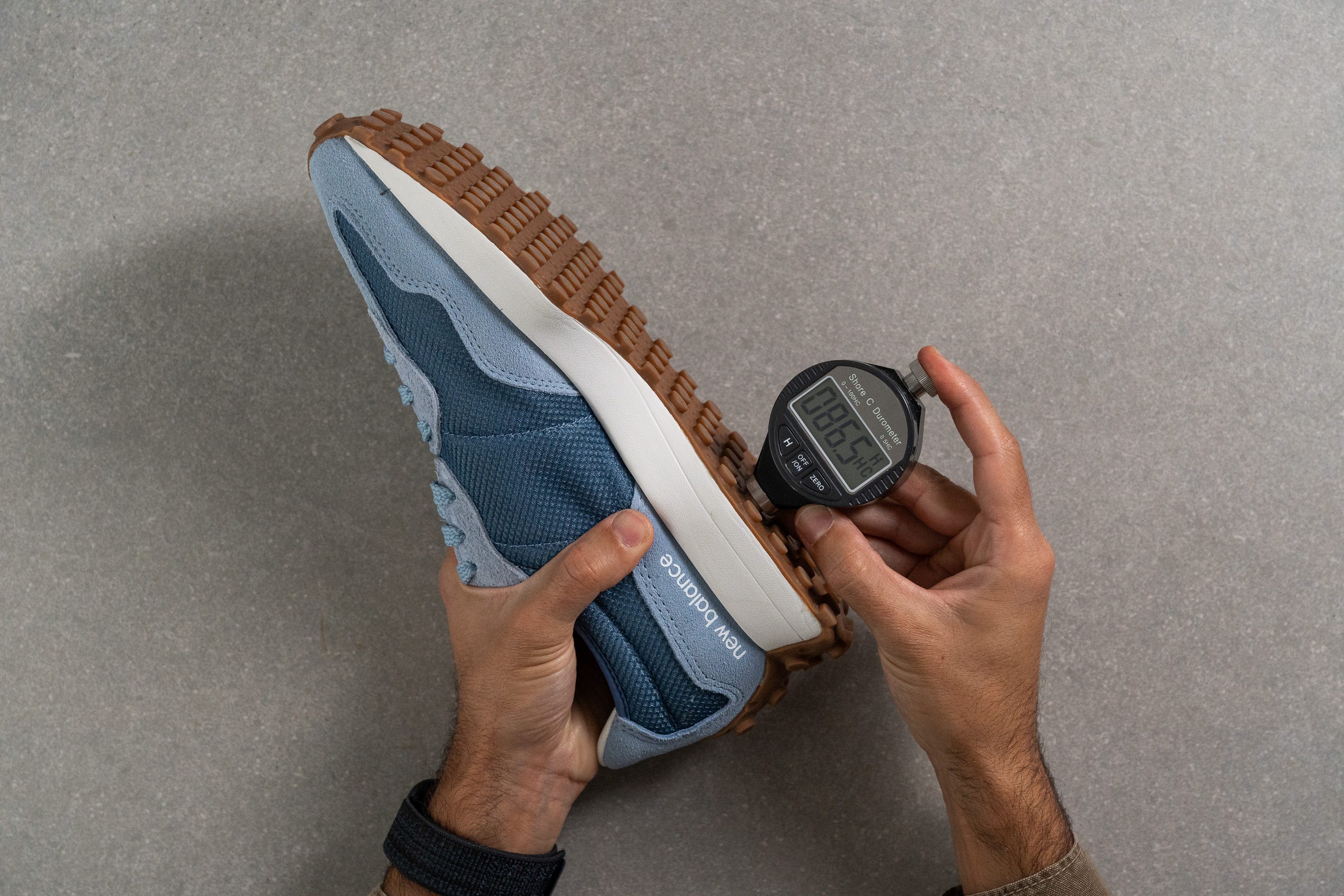
| 327 | 85.5 HC |
| Average | 85.7 HC |
Outsole durability
For the third and final appearance of our Dremel, we take aim at the 327’s prominent outsole. This time spinning at 10K RPM, we apply the tool’s grinding element to one of the mini-lugs that dot the outsole. While a fair amount of debris is kicked up, the Dremel doesn’t seem to have much effect throughout the twenty-second test.
Using a tyre tread gauge to assess the damage, we found that only 0.84 mm of rubber had been shorn off the outsole. This is less than the average sneaker loses in this same test and leads us to predict that the 327 should easily last 500 miles before showing any major signs of wear and tear.
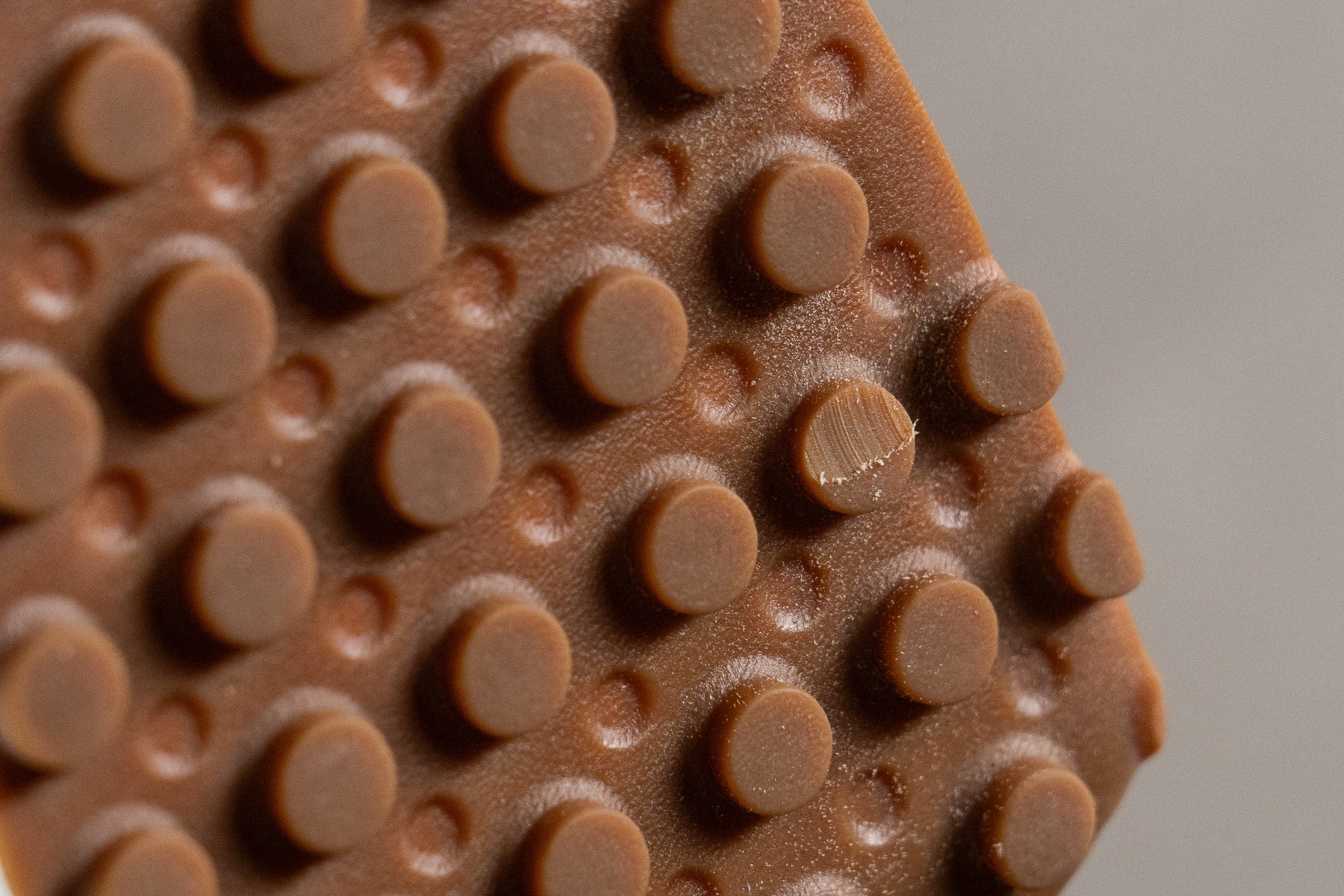
| 327 | 0.8 mm |
| Average | 1.1 mm |
Outsole thickness
The 327’s outsole is right on par with our current lab average at 5.7 mm thick according to our caliper measurements. This gives us no cause for concern as our previous test demonstrates that the outsole is hardy enough to withstand extreme wear and tear with ease.
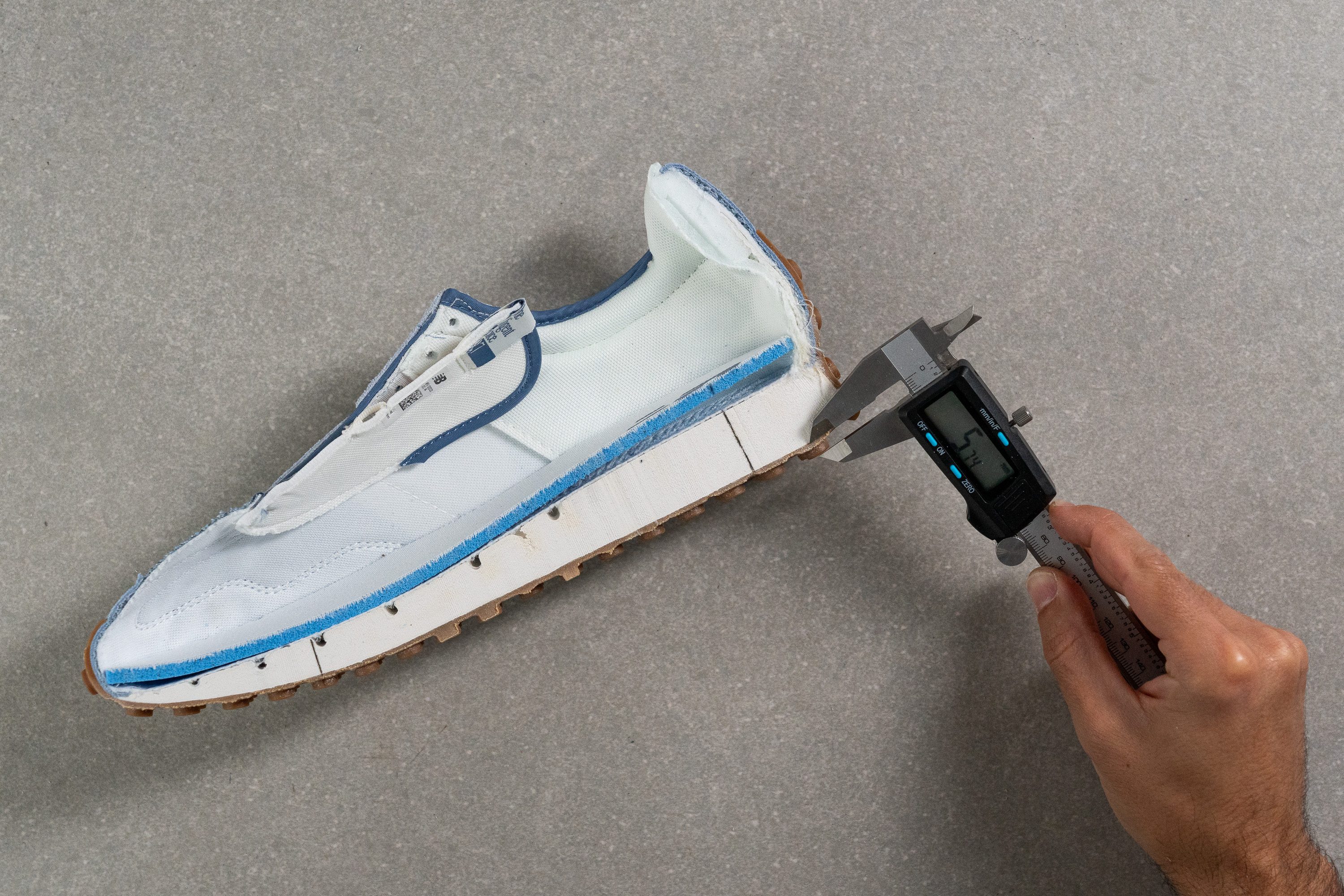
| 327 | 5.7 mm |
| Average | 5.3 mm |
Misc
Insole thickness
The 327’s insole is slimmer than average at only 4.4 m thick. However, we still found the interior of the shoe to be padded enough to complement the shoe’s midsole cushioning.
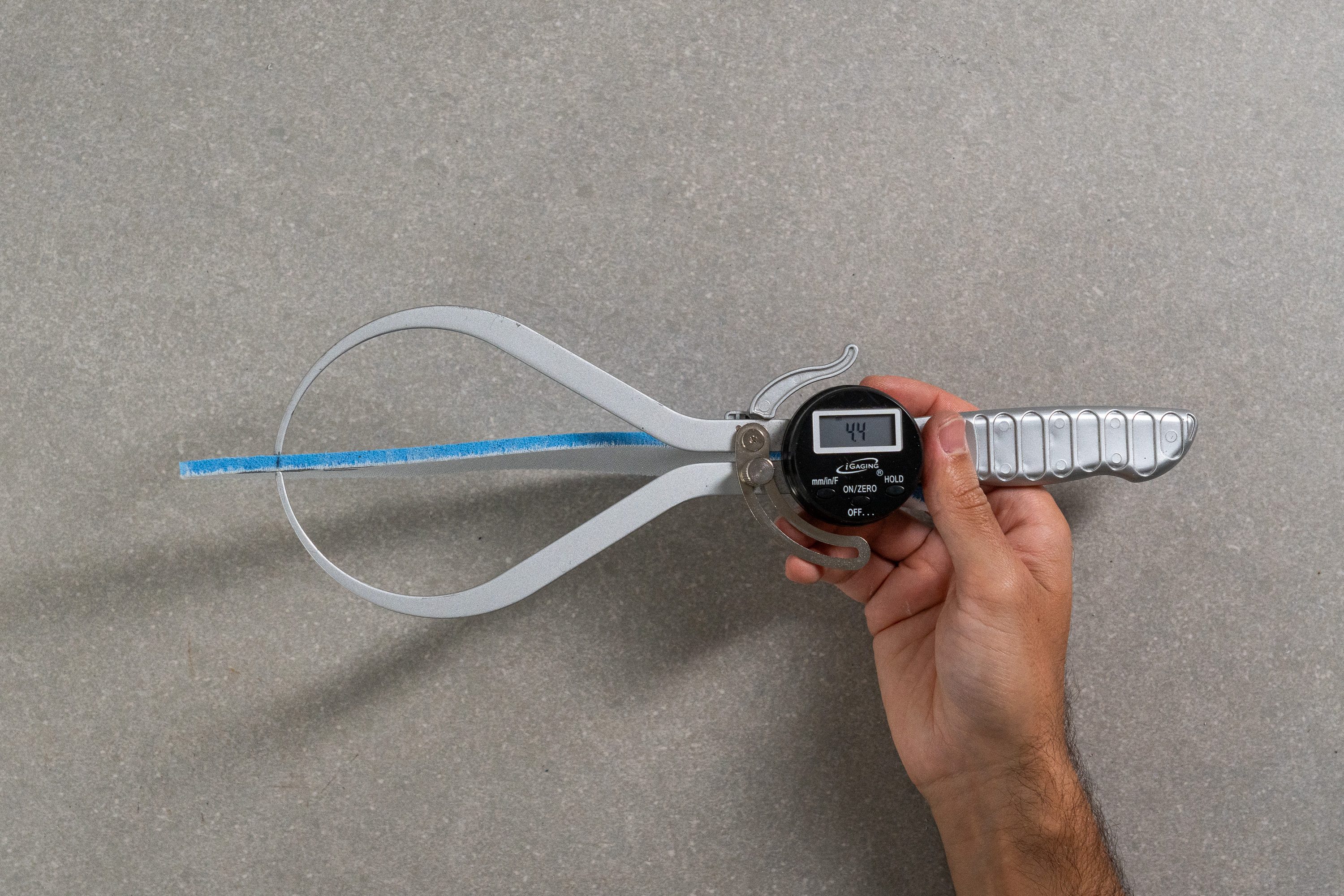
| 327 | 4.4 mm |
| Average | 5.1 mm |
Removable insole
The 327’s insole is fully removable, so those in need of custom orthotics can use them with this shoe.
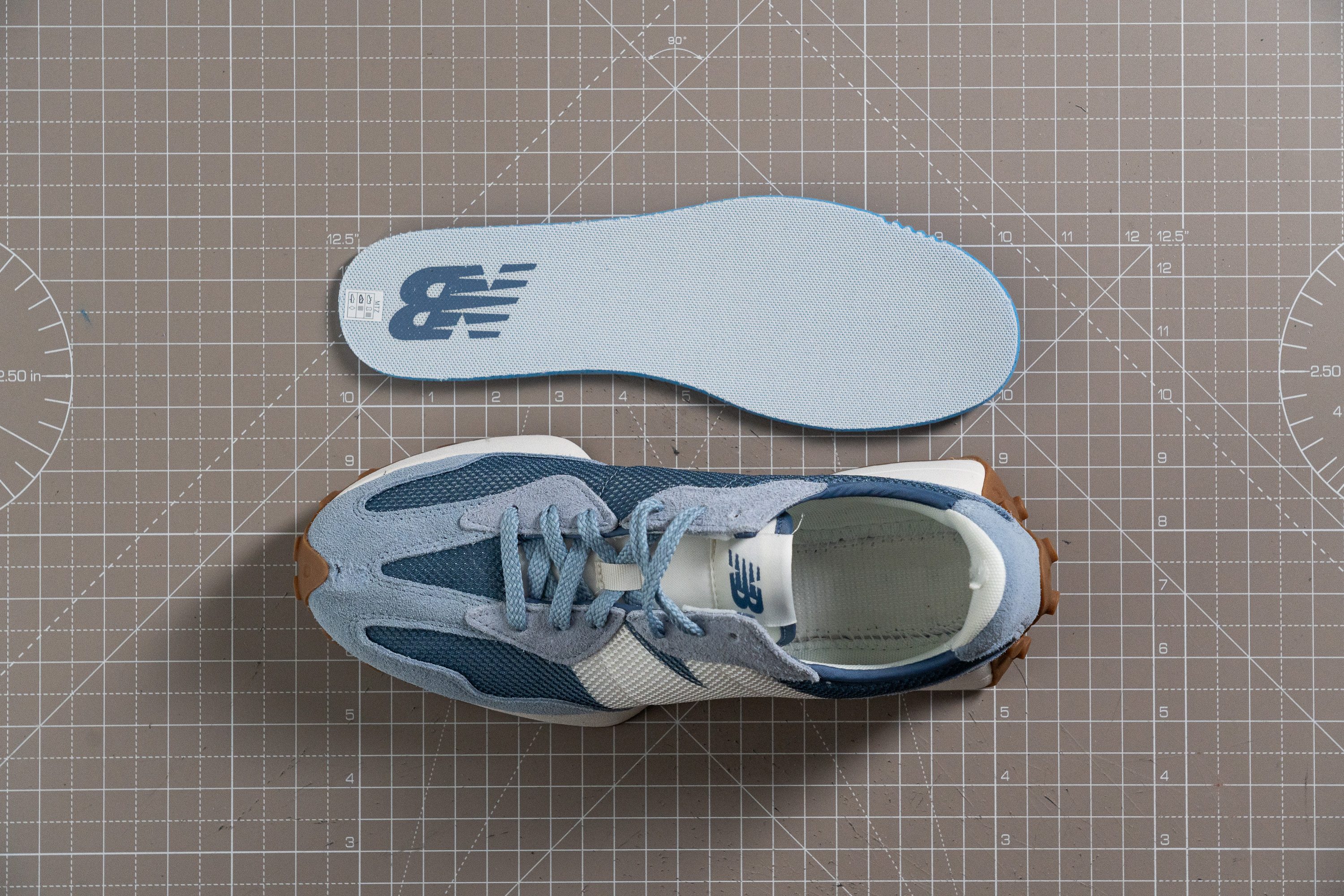
| 327 | Yes |
Reflective elements
The 327 doesn’t feature any reflective elements.
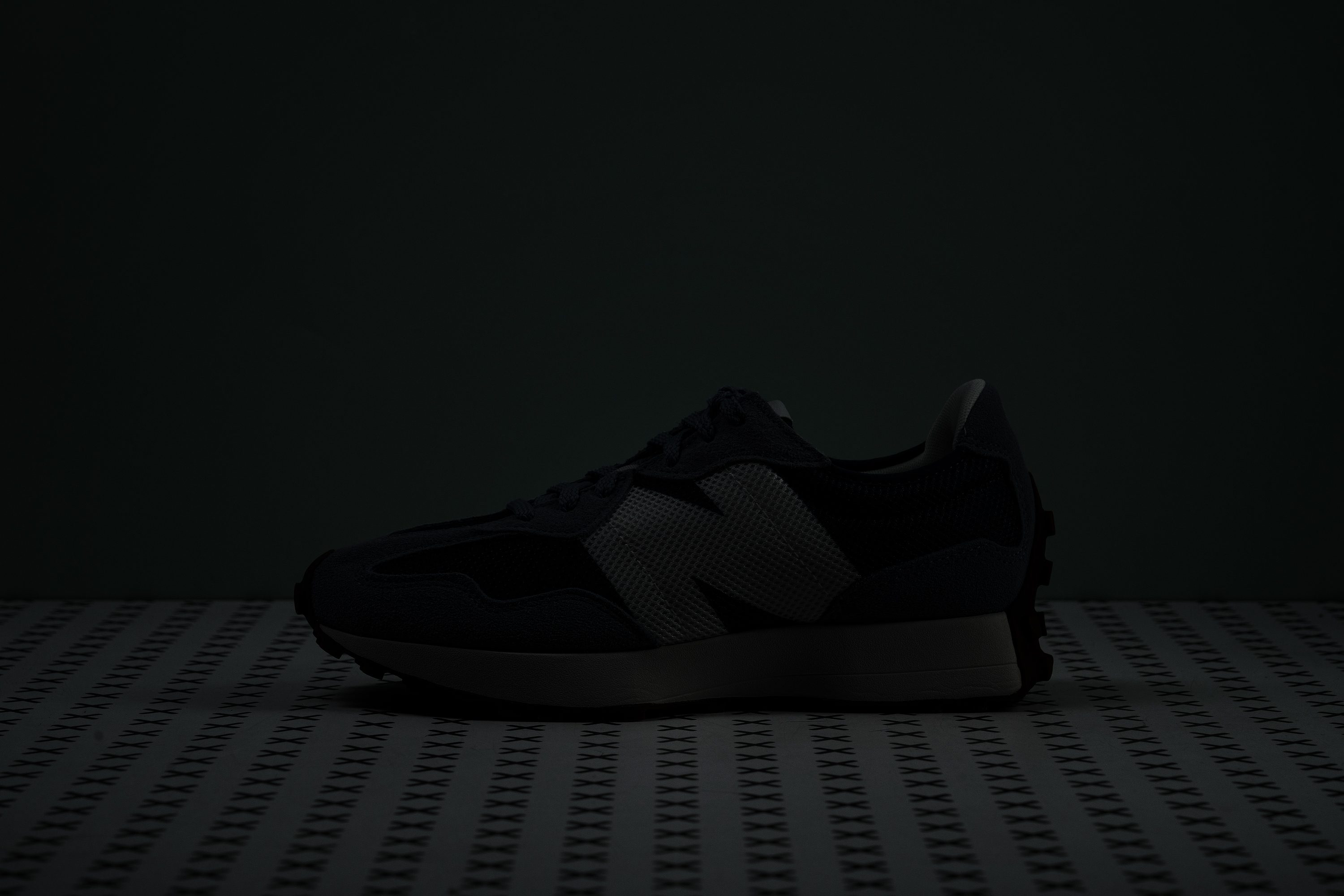
| 327 | No |
Tongue padding
At only 2 mm thick according to our calliper measurements, the 327’s tongue is much thinner than average.
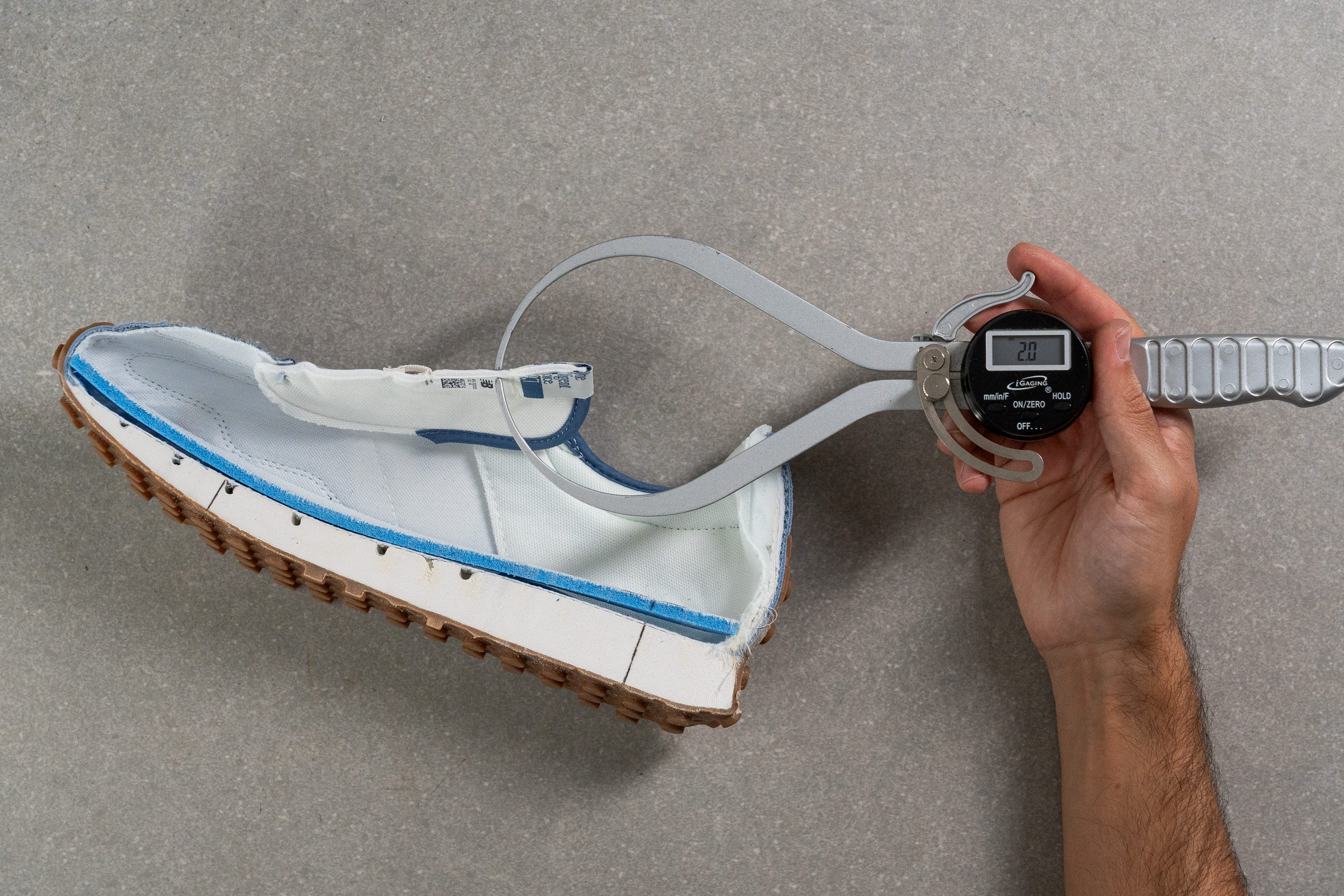
Despite this, we were able to achieve a snug and secure lockdown without the laces feeling too apparent across our instep.
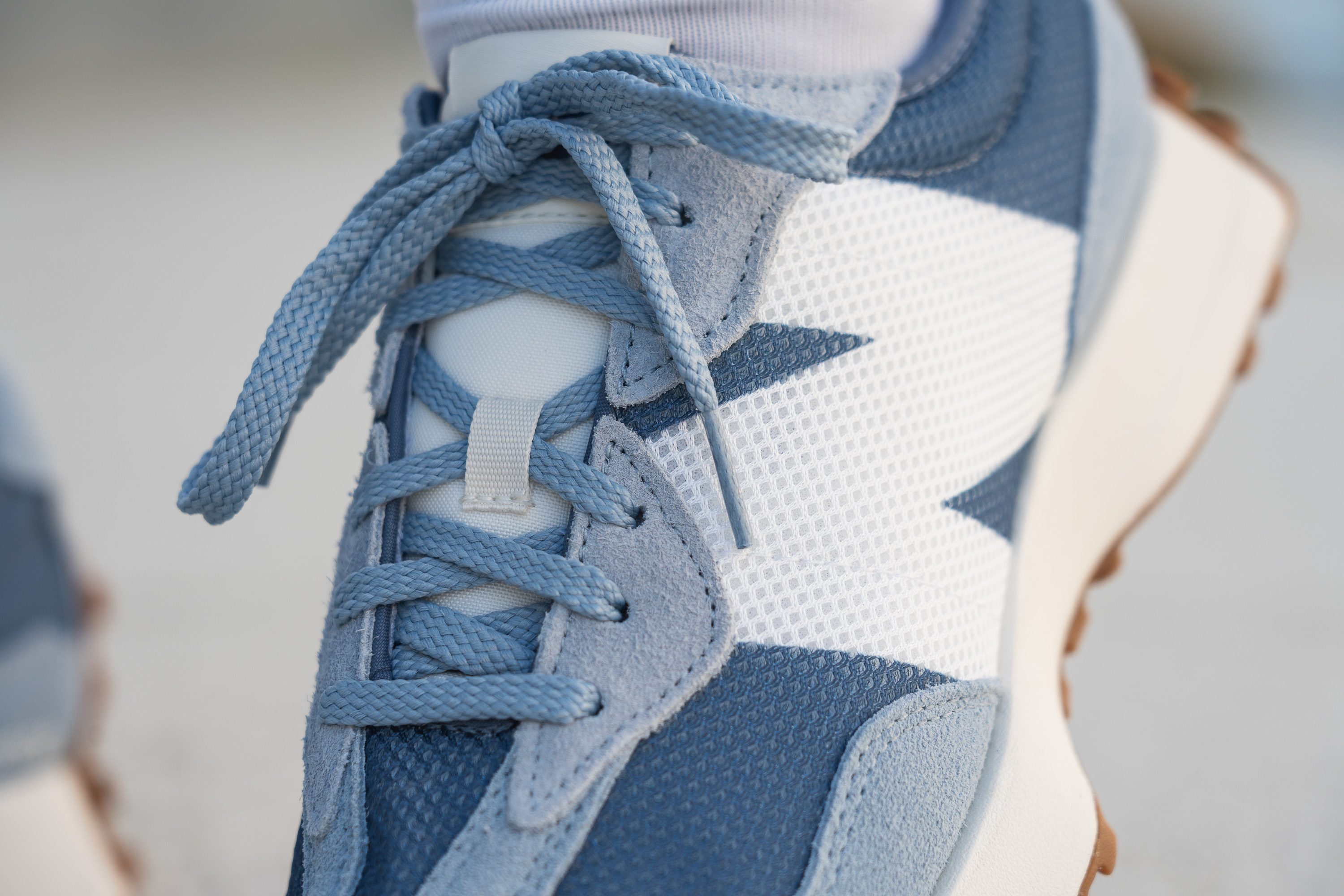
| 327 | 2.0 mm |
| Average | 9.6 mm |
Tongue: gusset type
While the 327’s tongue is non-gusseted, the central lace-loop helps to prevent it from slipping off to the side.
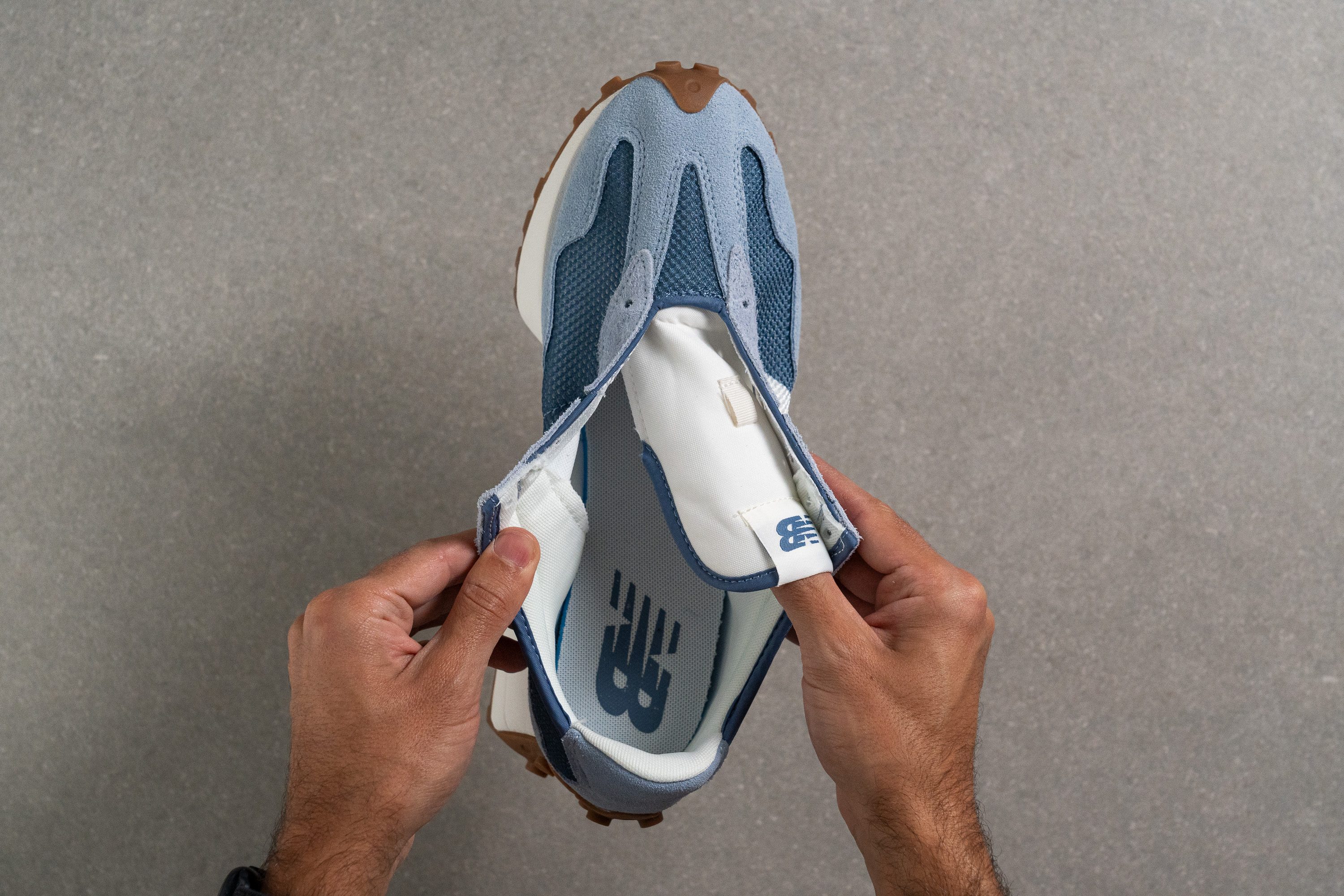
| 327 | None |

